
GASTST launches Saudi Statistician Program to attract national talents
The General Authority for Statistics (GASTAT) invites graduates from the statistics and mathematics departments, along with several other specializations, to join the Saudi Statistician Program. This initiative aims to attract young national talents to develop a distinguished cadre of national specialists in the field of statistics, enabling Saudi youth with expertise in the field of statistics to contribute to GASTAT’s national role.
GASTAT emphasized that this initiative aligns with the ongoing efforts to empower university graduates, enhance their capabilities and skills, and add value to the statistical sector. It aims to build a generation capable of supporting statistical activities and national institutions in both the public and private sectors, recognizing the critical role of the sector in aiding policy and decision makers.
In this context, GASTAT outlined several stages for joining the program. These include employing recent graduates to work directly at GASTAT for one year, during which they will receive intensive training in statistical work. This is followed by sponsoring them to pursue a master's degree. The program, open for applications until August 29 of this year, specifies the required specializations: statistics, mathematics, big data and analytics, economics, data science, quantitative methods, and data engineering.
It is noteworthy that GASTAT aims to achieve achieve leadership and advancement in the statistical sector, striving to be the most distinguished and innovative statistical reference to support social and economic development in Saudi Arabia, following the best international standards and practices.
GASTAT: Real estate prices increase by 1.7% in Q2 2024
According to the General Authority for Statistics, real estate prices in Saudi Arabia increased by 1.7% in the second quarter of 2024 compared to the same quarter last year. This rise is attributed to a 2.8% increase in residential real estate prices, according to the report published today by the General Authority for Statistics.
The report also revealed that residential land prices increased by 2.8% year-on-year due to the significant impact of the residential sector on the rise in real estate prices in the second quarter of 2024 compared to the same period in 2023. The residential sector experienced a 2.8% increase in the second quarter of 2024, while prices for residential buildings rose by 0.1%, villas by 0.5%, and houses by 1.4%. Meanwhile, apartment prices saw a 2.9% increase.
On the other hand, commercial real estate prices saw a 0.4% decline, influenced by a 0.4% decrease in commercial land prices. Prices for commercial exhibitions dropped by 0.6%, while prices for commercial buildings and centers remained stable in the second quarter of 2024, with no significant changes. In contrast, the agricultural sector experienced a 1.5% increase due to a 1.5% rise in agricultural land prices.
The Real Estate Price Index is based on administrative data from the Ministry of Justice concerning real estate transactions. It serves as an essential tool for helping authorities make informed economic and statistical decisions about real estate price trends and future projections. The index encompasses three primary sectors, each with distinct real estate categories: the residential sector (which includes land plots, buildings, villas, apartments, and houses), the commercial sector (which includes land plots, buildings, exhibitions, shops, and commercial centers), and the agricultural sector (which covers only agricultural land).
Non-oil activities grow by 4.4% during Q2 of 2024
The General Authority for Statistics released the real GDP Flash Estimates Publication for Q2 of 2024. According to the publication, there was a growth of 4.4% in non-oil activities and 3.6% in government activities, while the real GDP shrank by 0.4% from the Q2 of 2023, the 8.5% drop in oil-related activities was a contributing factor.
In contrast to Q1 of 2024, the seasonally adjusted real GDP increased by 1.4% in Q2 of 2024.
GASTAT unveils new Unified Number (199009)
The General Authority for Statistics (GASTAT) revealed its new unified phone number (199009), replacing the previous number (920020081), with the aim of improving communication with the public and enhancing user experience. This new number will be the only official telecom channel for individuals, government entities, and private organizations involved in GASTAT surveys.
The adjustment of the unified number aligns with GASTAT's digital transformation efforts and adheres to government directives regarding official communication channels for public entities. Dr. Fahad bin Abdullah Aldossari, President of the General Authority for Statistics, emphasized GASTAT's commitment to advancing the statistical sector through strategic resource utilization to produce accurate statistical data. The unified number will facilitate seamless access to sector-specific data processing, supporting robust data exchange among government entities, private institutions, and individuals.
Dr. Aldossari stated, "GASTAT is dedicated to enhancing statistical methodologies across various sectors to interpret economic and social indicators accurately, aiding in a clearer understanding of growth trends and contributing to the realization of inclusive and sustainable development in alignment with Saudi Vision 2030."
Additionally, GASTAT highlighted that the unified number will offer a range of services, including receiving requests for statistical data, managing inquiries and feedback, and engaging with the community and organizations to collect essential statistical information.
It is important to note that all information shared with GASTAT by citizens, residents, or establishments are kept confidential and will only be used for statistical purposes. GASTAT emphasized the value of collaboration with statistical researchers in data collection processes, underscoring its significance in the success of field surveys and statistical initiatives supporting socio-economic development plans in the Kingdom. GASTAT welcomes inquiries and information requests via the new unified number (199009), through the customer support email cs@stats.gov.sa, or on its official website www.stats.gov.sa."
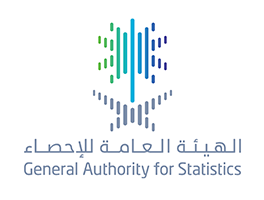
هيئة الإحصاء تستعرض تجربة تعداد السعودية عربياً في ورشة تدريبية
The Arab Institute for Training and Research in Statistics organized a virtual training workshop to review the experience of the Saudi Census 2022 and to benefit from the General Authority for Statistics' expertise in this field. The two-day workshop was attended by representatives of official statistical agencies from Arab nations.
During the workshop, the General Authority for Statistics team gave a summary of the Kingdom's statistical work development program and its main objectives. Additionally, they reviewed the phases of the Saudi Census 2022 project's implementation as well as the statistical approaches and techniques that were applied, including the use of geographic information systems, satellite photos, and geospatial data.
GASTAT: Unemployment rate for total population in Kingdom stabilizes at 3.5% in Q1 2024
The General Authority for Statistics (GASTAT) published on its official website www.stats.gov.sa on Sunday, June 30, 2024, the Labor Market Publication for the first quarter of 2024. This publication highlights the changes in the labor market following a reassessment of data from the fourth quarter of 2023 based on the Saudi Census 2022.
GASTAT reported that the overall unemployment rate, including both Saudis and non-Saudis, remained relatively stable at 3.5%, compared to 3.4% in the last quarter of 2023. Additionally, the unemployment rate for Saudis decreased to 7.6% in Q1 2024 from 7.8% in the previous quarter. The unemployment rate for Saudi females recorded a slight increase to 14.2% in Q1 2024, up from 13.9% in the previous quarter. However, the unemployment rate for Saudi males decreased to 4.2% from 4.6% in the previous quarter.
The labor force data for Q1 2024 showed an increase in the labor force participation rate for Saudis, reaching 51.4% compared to 50.4% in the previous quarter, while the rate for the total labor force (including Saudis and non-Saudis) decreased to 66.0% from 67.0% in Q4 2023.
The results of the Q1 2024 of the Labor Market Publication also revealed an increase in the labor force participation rate for Saudi females , which reached 35.8% compared to 35.0% in the previous quarter, while for Saudi males, the rate increased to 66.4% from 65.4% in the previous quarter.
GASTAT emphasizes that the Labor Market Publication relies on a household survey conducted by GASTAT under the category of social statistics. This survey gathers data through a representative sample of the population from various administrative regions in the Kingdom. By completing an electronic questionnaire with detailed questions, the survey provides estimates and indicators related to the labor force of the population aged 15 and above in Saudi Arabia. This includes estimating the population within and outside the labor force, as well as calculating important labor market indicators such as the unemployment rate, labor force participation rate, and others.
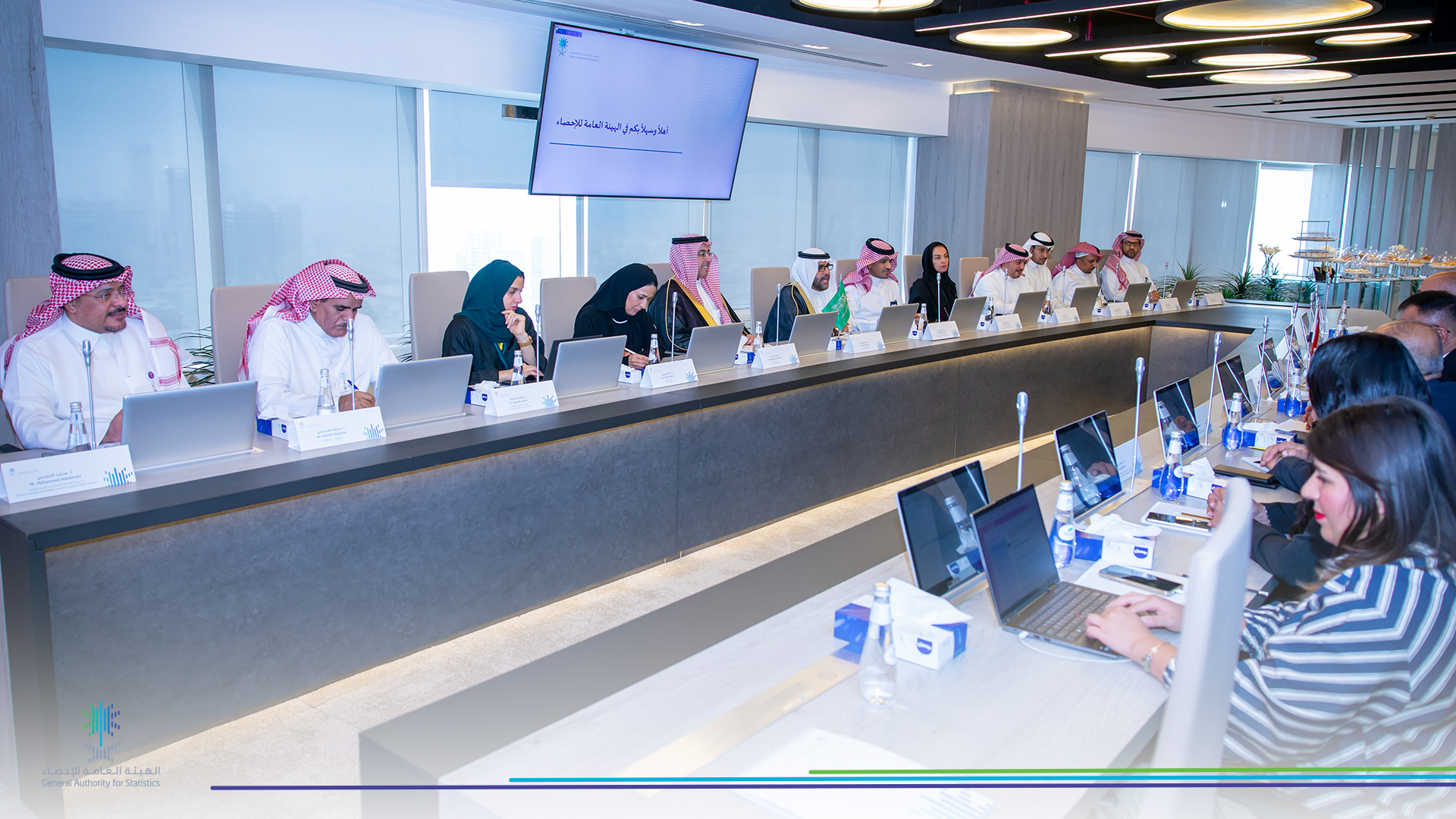
رئيس الهيئة العامة للإحصاء يستقبل الوفد الإحصائي العراقي لتطوير سبل التعاون المشترك
The President of the General Authority for Statistics welcomed the Iraqi statistical delegation led by Dr. Diaa Awad Kazem, President of the Statistics and Geospatial Information Authority in Iraq, to foster mutual cooperation. The meeting, held at GASTAT headquarters in Riyadh, aimed to introduce the Iraqi delegation to Saudi Arabia's statistical expertise, particularly focusing on the Saudi Census 2022. Discussions also revolved around enhancing collaboration in statistical fields and other mutual interests.
Dr. Fahad Aldossari greeted the delegation, highlighting the strong relations between the two countries and underlining the exchange of statistical expertise as a way to strengthen these ties. He elaborated on Saudi Arabia's efforts in statistical transformation, emphasizing the importance of accurate statistical databases for informed decision-making in line with Saudi Vision 2030.
Dr. Diaa Awad Kazem expressed gratitude for the warm reception and highlighted the Iraqi delegation's eagerness to learn from Saudi Arabia's experience in population census. He praised the Kingdom's progress in statistical work and expressed a keen interest in enhancing mutual statistical cooperation.
The meeting was attended by officials from both sides, and the visit will span two days. The focus will be on reviewing GASTAT's experience in carrying out the General Population and Housing Census (Saudi Census 2022), along with discussions on various aspects of statistical work, such as data collection, analysis, storage methods, and the dissemination of statistical data.
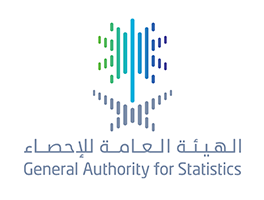
الهيئة العامة للإحصاء: ارتفاع الصادرات غير البترولية بنسبة 12.4% في أبريل 2024م
The General Authority for Statistics (GASTAT) announced today, Monday, June 24, 2024, the results of international trade for April 2024, and published them on its official website at www.stats.gov.sa.
The publication results indicated an increase of 12.4% in non-oil exports in April 2024 compared to April 2023. The results also reported a 1.6% increase in the value of national non-oil exports (excluding re-exports), while the value of re-exported goods saw a 56.4% increase in April 2024 compared to April 2023, reaffirming the Kingdom's pivotal role in international trade as a global gateway for international goods.
The publication highlighted that "Plastics, rubber, and their products" rank among the most important non-oil export goods, accounting for 26.2% of total non-oil exports, showing a 20.5% annual increase compared to April 2023, reflecting the care for the promising Saudi economy and its diverse sectors.
Moreover, the results of the publication showed an increase in the ratio of non-oil exports (including re-exports) to imports in April 2024, reaching 37.1% compared to 32.6% in April 2023; this was a result of the increase in non-oil exports by 12.4% and the decrease in imports by 1.3% during this period. Meanwhile, the value of merchandise imports decreased by 17.4%, and the trade balance recorded a 36.0% increase compared to March 2024.
GASTAT: Total number of pilgrims in 1445 H Hajj season is 1,833,164
The General Authority for Statistics (GASTAT) announced that the total number of pilgrims for the 1445H Hajj season amounted to (1,833,164) pilgrims, with (1,611,310) pilgrims arriving from outside the Kingdom through various entry points and (221,854) internal pilgrims, including citizens and residents.
GASTAT’s statistical results for this year's Hajj season revealed that the total number of male pilgrims, both internal and external, amounted to (958,137) pilgrims, while the total number of female pilgrims stood at (875,027) pilgrims. Regarding pilgrims coming from outside the Kingdom, GASTAT explained that the percentage of pilgrims from Arab countries reached (22.3%), while pilgrims from Asian countries, excluding Arab countries representing (63.3%) of the total. Additionally, the percentage of pilgrims from African countries, excluding Arab countries, comprising (11.3%) of the total, whereas the percentage of pilgrims from Europe, America, Australia, and other uncategorized countries constituting (3.2%) of the total.
Regarding the ways of arrival for pilgrims from outside the Kingdom, (1,546,345) pilgrims arrived through air entry points, while (60,251) pilgrims arrived through land entry points, and (4,741) pilgrims arrived through sea entry points.
It is worth mentioning that the General Authority for Statistics relied on administrative records as the main data source for issuing statistical data and indicators for the 1445 H/2024 Hajj season. These records were provided by all relevant government and private entities responsible for serving the guests of Allah, following a unified model encompassing various elements. The Hajj Statistics Publication provides a breakdown of the total pilgrim number by gender, nationality, and way of arrival. It is worth noting that GASTAT serves as the official and sole statistical reference for statistical data and information in the Kingdom of Saudi Arabia, undertaking all statistical activities, providing technical oversight, conducting field surveys, research, data analysis, and managing documentation, preservation, and tabulation of statistical information across all aspects of life in the Kingdom. On this occasion, Dr. Fahad bin Abdullah Aldossari, President of the General Authority for Statistics, expressed gratitude to the Custodian of the Two Holy Mosques, King Salman bin Abdulaziz Al Saud, and His Royal Highness Prince Mohammed bin Salman bin Abdulaziz Al Saud, Crown Prince and Deputy Prime Minister, for their provision of amenities to the pilgrims, praying for Allah's acceptance of the pilgrims' Hajj and success for all government entities in delivering exceptional services.
To view the executive summary of Hajj statistics 1444 AH, please visit the following link:
https://www.stats.gov.sa/system/tdf/file_manger/Hajj%20Report%201445H-EN...
GASTAT: Non-oil activities grow by 3.4% in Q1, 2024
On Sunday June 9, 2024, the General Authority for Statistics (GASTAT) released the report of Gross Domestic Product (GDP) and National Accounts Indicators for the first quarter of 2024 via its official website www.stats.gov.sa. According to estimates, the real GDP witnessed a decrease of 1.7% compared to the first quarter of 2023, affected by a decline in oil activities by 11.2%.
In parallel, both non-oil activities and government activities achieved growth rates of 3.4% and 2.0% respectively. Meanwhile, the seasonally adjusted real GDP during the first quarter of 2024 increased by 1.4% compared to the fourth quarter of 2023.
It is worth mentioning that non-oil activities maintained their growth rates, constituting 50% of the GDP at current prices. This aligns with the objectives of Saudi Vision 2030, which seeks to establish a thriving economy that showcases the success of vision programs and legislative reforms, while also demonstrating progress in major projects and national strategies.
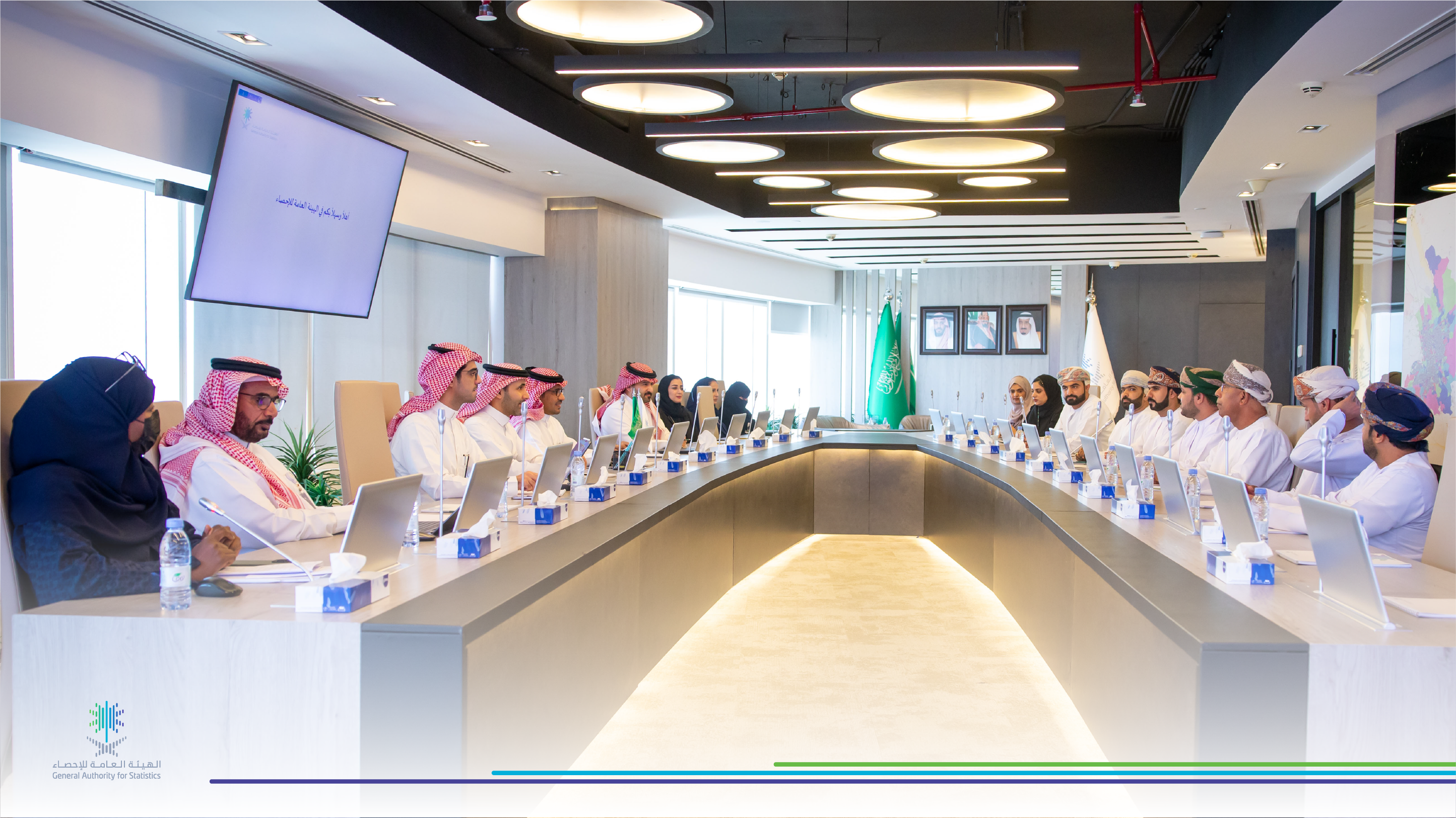
الهيئة العامة للإحصاء تستقبل وفداً من عدة جهات حكومية بسلطنة عمان
GASTAT obtains ISO certification in quality management system
The General Authority for Statistics obtained the ISO 9001:2015 certification by the International Organization for Standardization (ISO). This recognition is given to organizations that excel in effectively identifying, assessing, and managing quality. It validates these organizations' capability to make quality management decisions, seize opportunities, enhance performance, safeguard against threats, and fully satisfy customers. GASTAT received this certification following a comprehensive examination of its internal policies and procedures, as well as an evaluation of their practical implementation based on evidence verifying actual practices.
Dr. Fahad bin Abdullah Aldossari, President of the General Authority for Statistics, expressed his appreciation for the efforts invested in adhering to the quality standards and requirements of the ISO certification. He emphasized that obtaining this certification is a culmination of GASTAT’s efforts aimed at developing its statistical system. This includes ensuring the highest level of data quality, building sustainable value for statistical products, conducting comprehensive evaluation, and focusing on digital transformation to leverage modern technologies and international best practices, thereby ensuring high efficiency in performance and delivering high-quality statistics.
It is worth mentioning that this certification, granted by the International Organization for Standardization (ISO) to organizations that successfully achieve comprehensive global standards in systems, policies, and procedures, signifies a significant milestone for the General Authority for Statistics. ISO is an independent, non-governmental international organization comprised of 170 specialized agencies dedicated to developing and implementing standards related to quality and institutional excellence.
The General Authority for Statistics serves as the national entity for producing official statistics across all domains in the Kingdom. Its data is used as a reliable basis for formulating economic and social policies, supporting decision-makers and policy planners in enhancing development plans for various sectors. Additionally, the statistics provided by GASTAT are utilized for conducting accurate and transparent local, regional, and international comparisons. GASTAT also prepares national statistical tools and classifications in accordance with international standards, updates and develops them, and provides accurate data to both local and international private sectors and investors, thereby encouraging investment in the Kingdom, in line with the objectives and aspirations of Saudi Vision 2030.
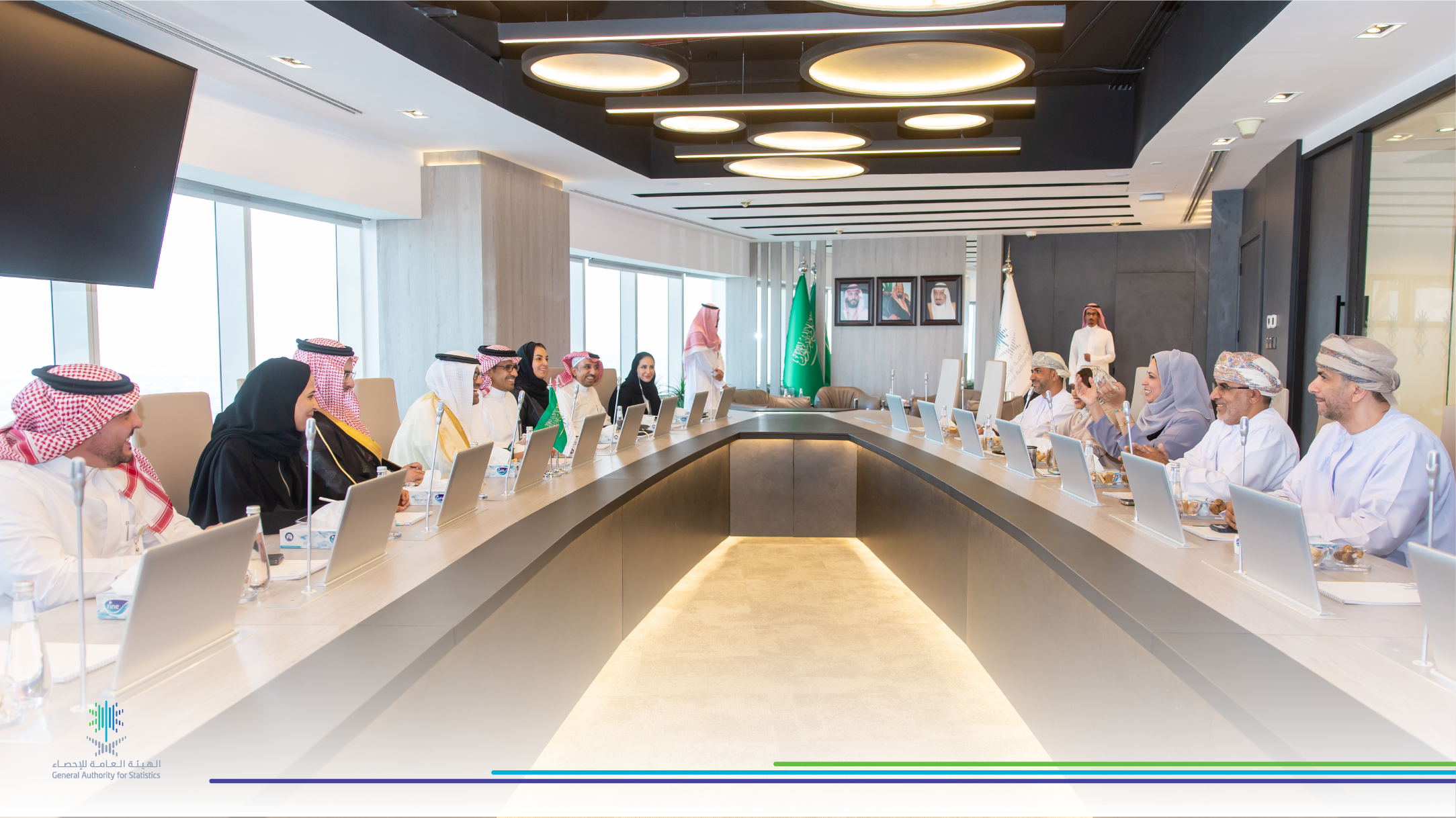
رئيس هيئة الإحصاء يبحث مع المركز الإحصائي الخليجي سبل التعاون المشترك في العمل الإحصائي
Dr. Fahad bin Abdullah Aldossari, President of the General Authority for Statistics, met with Ms. Intisar bint Abdullah Al-Wahibi, Director General of the Statistical Center for the Gulf Cooperation Council (GCC) Countries, at GASTAT’s headquarters in the capital Riyadh. During the meeting, they discussed ways to enhance joint cooperation, reviewed opportunities for developing collaboration, and delved into various topics of mutual interest, particularly in the realm of statistical data.
The two sides explored ways to strengthen mutual coordination in the field of statistical data. They also discussed the establishment and ongoing development of the statistical database, along with GASTAT’s strategies for statistical data, methods, quality assurance, and governance. Furthermore, they examined approaches to enhancing both human and institutional statistical capacities through a range of core activities offered by the Center. Among these activities, they highlighted the support program for countries and members, which aims to enhance statistical work and standardize and improve its quality.
Aldossari pointed out that the recent years have seen considerable growth in statistical activities in the Kingdom. This transformation has been driven by statistical initiatives and projects led by the General Authority for Statistics. The objective has been to generate statistical data and indicators while continuously advancing the integration of diverse data sources. This has been facilitated by leveraging optimal data management infrastructure and governance practices, along with the consistent use of cutting-edge technology for ongoing enhancement. Additionally, the country has actively engaged in international workshops and conferences, prioritizing the development of national talent.
Its worth noting that the Statistical Center for the Gulf Cooperation Council (GCC) Member States serves as the official source for data, information, and statistics pertaining to the GCC countries. Its mandate is to enhance statistical and informational work for national statistical centers and planning bodies within the GCC countries. The establishment of the center was approved by the Ministerial Council for the GCC in September 2011, and its statute was adopted by the Supreme Council of the GCC in December 2012. The Supreme Council consists of the Majesties and Highnesses, Heads of the member countries: the United Arab Emirates, the Kingdom of Bahrain, the Kingdom of Saudi Arabia, the Sultanate of Oman, Qatar, and Kuwait.
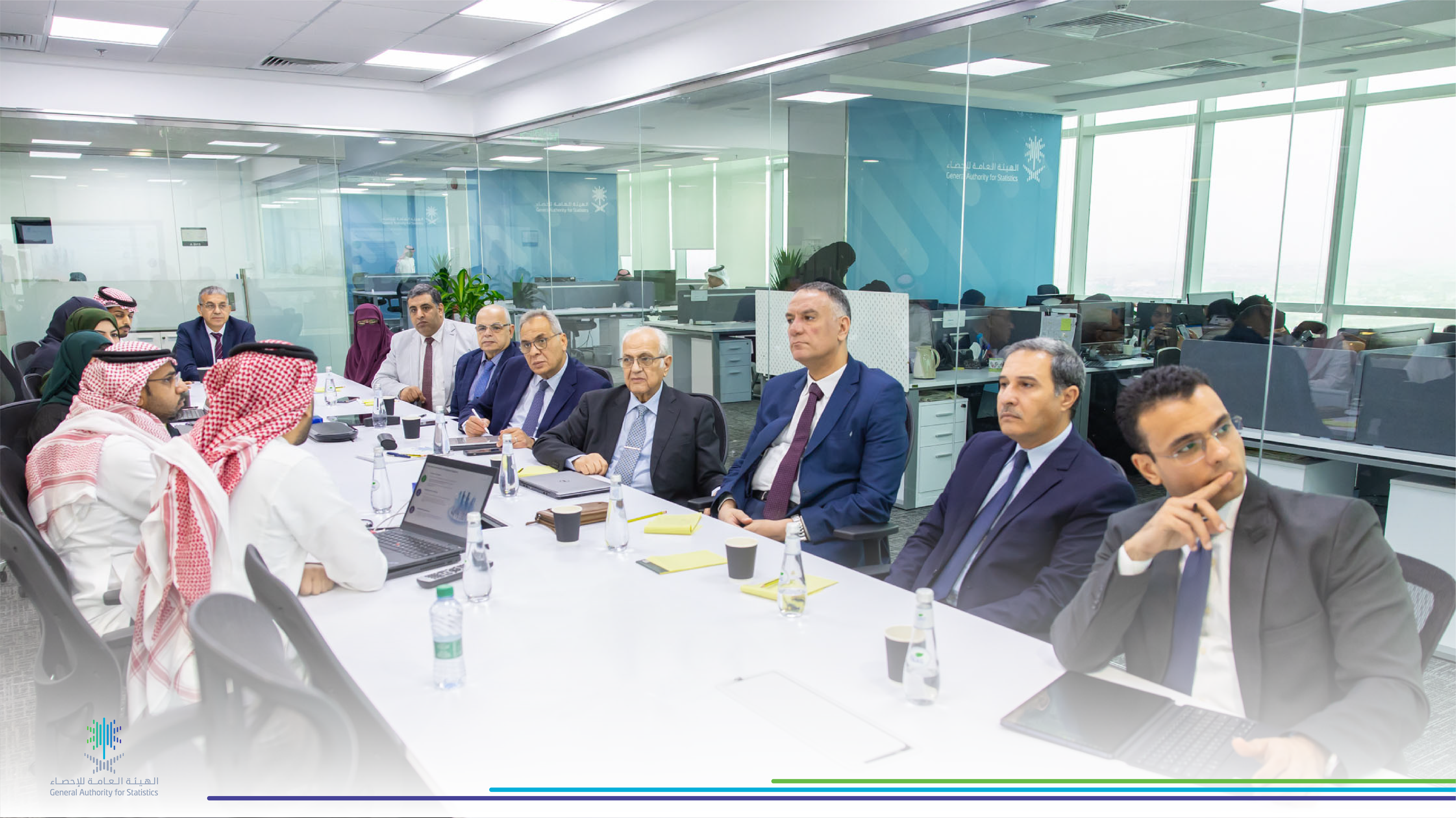
"الإحصاء" تستقبل وفداً من الجهاز المركزي للتعبئة العامة والإحصاء بمصر
GASTAT welcomed a delegation from the Central Agency for Public Mobilization and Statistics (CAPMAS) of the Arab Republic of Egypt. The meeting held at GASTAT’s headquarters in Riyadh over three days, explored ways to enhance joint work in the statistical sector and opportunities for developing cooperation in statistical data. Various topics of mutual interest in the statistical field were also discussed, alongside gaining insights into Saudi Arabia’s experience in population censuses.
The two sides discussed the stages of Saudi Census 2022 project, methods of calculating all statistical indicators and an introduction to the statistical database. They also covered the continuous development efforts that GASTAT is implementing in its statistical data strategy, aiming to provide updated statistical data to enhance joint efforts toward sustainable development goals. This includes ongoing advancements in indicator calculation methods, the exchange of statistical expertise, and the improvement of the quality of statistical data.
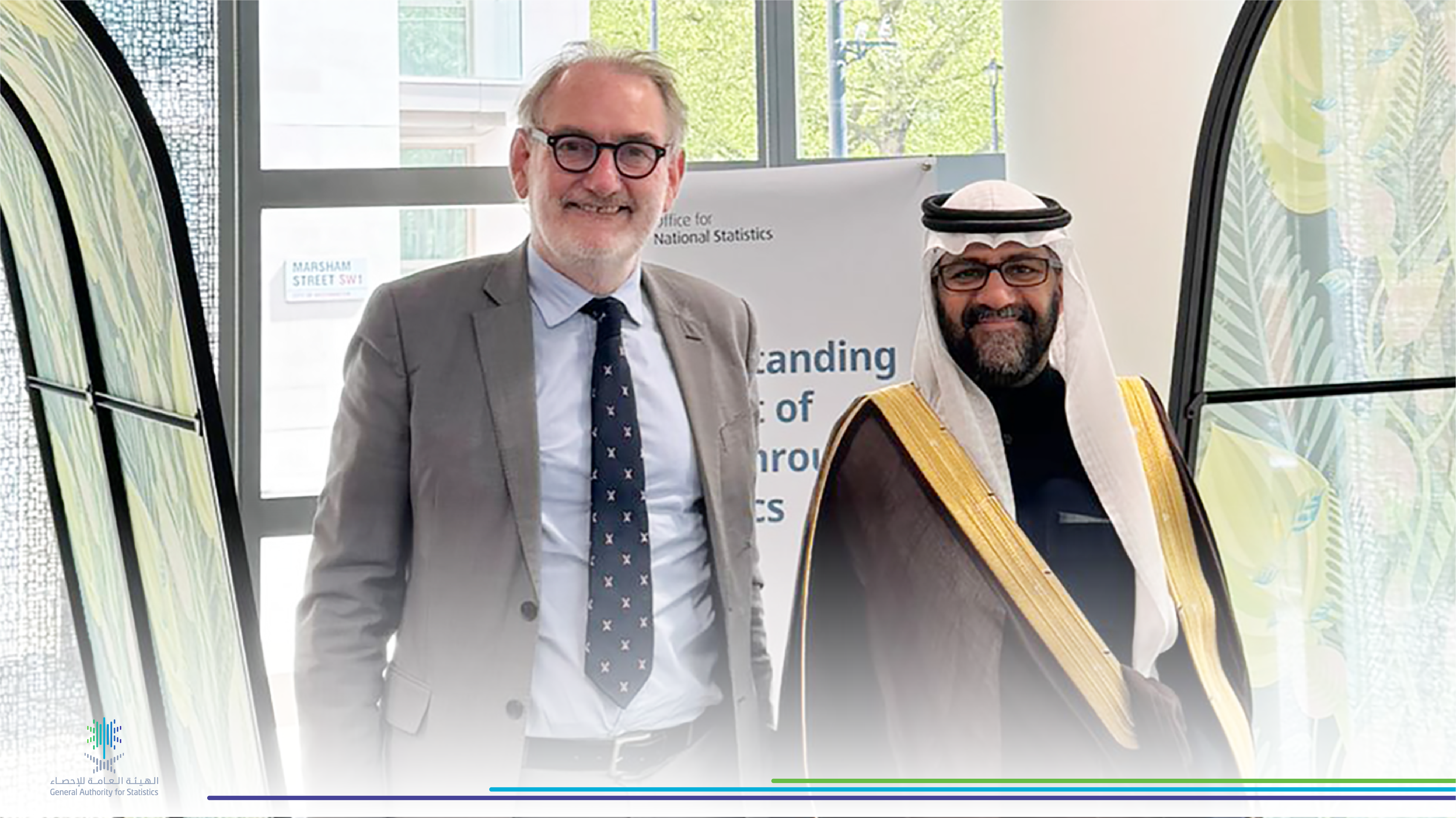
رئيس الهيئة العامة للإحصاء يلتقي مدير مكتب الإحصاءات البريطاني
Dr. Fahad Aldossari, President of the General Authority for Statistics (GASTAT), met with Mr. Ian Diamond, Director of the UK Office for National Statistics, in London. This meeting was part of the delegation's visit to the United Kingdom. During the meeting they discussed ways to enhance joint work in the statistical field, reviewed recent developments, and strengthened the exchange of expertise between the two countries in this context, considering the agreement signed between the two entities.
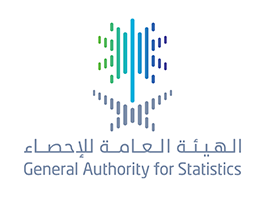
الهيئة العامة للإحصاء توقع مذكرة تعاون مع المجلس الصحي السعودي
The General Authority for Statistics (GASTAT) signed a memorandum of cooperation with the Saudi Health Council aiming at enhancing cooperation, strengthening coordination, and integrating efforts in their respective areas of specialization. The memorandum sets a general framework for joint activities, tasks, and institutional capacities development between both parties, within the context of achieving partnership and integration among government sectors.
The signing ceremony took place at the headquarters of the Council's General Secretariat. The Saudi Health Council was represented by Nahar bin Mazki Al-Azmi, Secretary-General of the Saudi Health Council, while GASTAT was represented by Dr. Fahad bin Abdullah Aldossari, President of the General Authority for Statistics.
The memorandum aims to exchange support, technical expertise, and knowledge between the two parties. It also aims to provide advice in the field of research, studies, publications, and statistics exchange in the healthcare sector. Additionally, it seeks to provide the necessary indicators to measure the performance and impact of the healthcare sector, which will contribute to supporting health policy formulation and decision-making processes.
Furthermore, the memorandum covers cooperation in various aspects, including collaborative research projects and the development of human capacities for employees of both entities within their respective domains. This will be facilitated through training courses, seminars, scientific conferences, and workshops.
GASTAT launches Comprehensive Agricultural Survey
The General Authority for Statistics (GASTAT) launched the Comprehensive Agricultural Survey in all regions and governorates of the Kingdom. This survey aims to collect basic and structural data on agricultural activity in the Kingdom, covering both plant and animal sectors, with the goal of provideing an agricultural database on which decision-makers and policymakers can rely and use as a trusted reference, thereby aiding in the formation of agricultural activities plans and future goals.
In the same context, the survey provides agricultural data to meet local, regional, and international statistical requirements. It also helps in the conduction of studies, analyses, and statistical comparisons in this field, in addition to supplying researchers, scholars, and interested parties with the necessary statistical data on agricultural activity. These data can be used in research and scientific studies to foster the advancement of agricultural activity in the Kingdom.
GASTAT clarified that the Comprehensive Agricultural Survey will be implemented through telephone interviews, self-completion questionnaires, and field visits. It urges all concerned parties to actively participate in providing the required data for the survey. It assures that the information provided by citizens, residents, or establishments will be kept strictly confidential and used only for statistical purposes. GASTAT welcomes all inquiries and requests for information through its representatives via the unified statistical telephone number (920020081), the customer support email (cs@stats.gov.sa), or its website (www.stats.gov.sa).
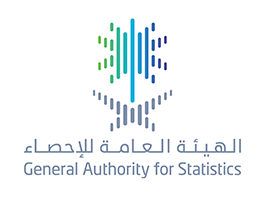
"الإحصاء" تصدر إحصاءات الاستثمار الأجنبي المباشر خلال الربع الرابع لعام 2023 م
In Q4 of 2023, the net value of foreign direct investment (FDI) flows in the Kingdom amounted to SAR 13 billion, representing an increase of more than 16% compared to Q3 of the same year. This information is based on the Foreign Direct Investment Publication for the fourth quarter of 2023 from the General Authority for Statistics.
The results of the Publication showed that the value of FDI inflows into the Kingdom's economy reached SAR 19 billion, an increase of 16.6% compared to Q3 of the same year, which was valued at SAR 16 billion.
The Publication also indicated that the value of FDI outflows from the Kingdom's economy was about SAR 6 billion, representing an increase of 17.6% compared to Q3 of the same year, which amounted to SAR 5 billion.
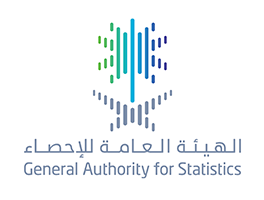
الإحصاء: انخفاض معدل البطالة في المملكة إلى 4.4% في الربع الرابع 2023م
The General Authority for Statistics (GASTAT) issued today the Labor Market Publication for Q4 of 2023. According to the results of this publication, the total unemployment rate (for Saudis and non-Saudis) decreased to 4.4% from Q3, 2023 by 0.7 percentage points, where it was 5.1%. The unemployment rate for Saudis also decreased to 7.7% in Q4 of 2023 compared to 8.6% in Q3, 2023. Additionally, the unemployment rate for Saudi females during Q4 of 2023 decreased to 13.7% compared to 16.3% in the previous quarter, while the unemployment rate for Saudi males remained stable at 4.6% in Q4 of 2023.
During the fourth quarter of 2023, the labor force indicators showed a decline in the total participation rate in labor force (for Saudis and non-Saudis) compared to Q3, 2023, reaching 60.4%. Moreover, the participation rate in labor force for Saudis dropped to 51.3%, compared to the previous quarter.
The results of the Labor Market Publication also indicated a decrease in the participation rate in labor force for Saudi females during Q4 of 2023, with 35.5% compared to the previous quarter. However, the participation rate in labor force for Saudi males in Q4 of 2023 decreased to 66.6% compared to 66.8% in the previous quarter.
It is worth mentioning that the Labor Market Publication bases its results on a household survey conducted by GASTAT falling under the social statistics. Data is collected through a representative sample of population from various administrative regions in the Kingdom of Saudi Arabia, by completing an electronic questionnaire containing several questions. This process provides estimates and indicators related to the labor force of population in the working age group (15 years and above) residing in the Kingdom of Saudi Arabia, estimating the population (inside and outside the labor force), and calculating key labor market indicators such as the unemployment rate, labor force participation rate, and others.
GASTAT participates in 55th session of the United Nations Statistical Commission
General Authority for Statistics participated in the fifty-fifth session of the United Nations Statistical Commission which took place from 27 February to 1 March 2024 at the United Nations Headquarters in New York. Representatives of member states' statistical offices and representatives of United Nations statistical organizations involved in statistical work took part in the session.
The session discussed topics related to international statistical activities, reviewed practices related to sustainable development indicators for the year 2023 and the progress made, as well as discussed indicators related to economic, social, spatial, and resource statistics. It also addressed developments in the methodologies of calculating statistical indicators and indices and their applications in participating countries, as well as new and improved data collection methods.
Such sessions are important as they work on reviewing and setting statistical standards, developing concepts and methods used by official statistical offices worldwide and discussing new international statistical methodologies, standards, and classifications. They also shed light on reviewing key international statistics related to economic and social matters and discussing international efforts to develop the capabilities of statisticians.
It is worth mentioning that the United Nations Statistics Division organizes the Statistical Commission session annually in the first quarter of each year. This session is one of the highest levels of international statistical sessions and serves as a reference for those interested in statistical field.
Saudi Arabia hosts the 48th meeting of the Board of Trustees of the Arab Institute for Training and Statistical Research
The city of Jeddah will host the 48th meeting of the Board of Trustees of the Arab Institute for Training and Statistical Research. This session will take place on October 4 -5, 2023, and will discuss common statistical issues with the aim of providing accurate data to support comprehensive economic and social development plans at the regional Arab level. This will be achieved by supporting the official statistical systems in Arab countries to fulfill their developmental duties at both national and regional levels in providing accurate data and indicators that contribute to enhancing opportunities for better developmental policy-making.
The official heads of Arab statistical centers will participate in these meetings, with Saudi Arabia hosting this 48th session as a confirmation of its leading role in the Arab world and its commitment to enhancing Arab communication and joint work in all fields, especially in the field of Arab statistical work. This aims to exchange experiences among member countries and provide statistical data to support development plans.
The agenda includes various activities aimed at enhancing the production and dissemination of accurate statistical data in accordance with international methodologies and standards. Additionally, there will be efforts to develop a strategic vision to improve the level of Arab statistical work, improve the technical and scientific capabilities of human resources in the official statistical agencies of Arab countries, exchange statistical knowledge and experiences to strengthen Arab solidarity and cooperation, and develop high-quality statistics production to drive development forward.
Saudi Arabia hosts OIC Statistical Commission 12th session.
Saudi Arabia will host the 12th session of the Organization of Islamic Cooperation Statistical Commission (OIC-StatCom). The meetings of this session will be held in the city of Jeddah and will last for two consecutive days October 3-4, 2023. The meeting will be attended by the heads of official statistical centers in the countries of the Organization of Islamic Cooperation. This is the first time that the meetings of this commission are held outside the headquarters country (Turkey). Saudi Arabia's hosting of this session reflects its international status and its Arab and Islamic position, affirming its keenness to enhance communication and joint work among Islamic countries to provide statistical data for the support of development plans and exchange experiences among member countries.
The 12th session of OIC-StatCom aims to develop the technical and scientific capabilities of statistical personnel in the official statistical agencies of member countries and exchange statistical knowledge and experiences to support the member countries in producing high-quality statistics, guided by specific objectives and principles in order to enhance solidarity and cooperation among Islamic countries.
The agenda comprises of a number of activities meant to improve the production and dissemination of precise and updated statistical data in compliance with international standards and procedures. Additionally, efforts will be made to develop a strategic vision to improve the level of statistical systems, implement and monitor short, medium, and long-term plans to achieve this vision, and enhance the technical capabilities of national statistical agencies in Islamic countries.
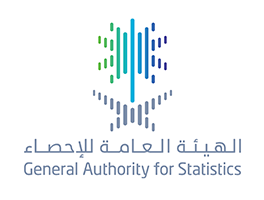
GASTAT adopts chain-linked methodology in calculating real GDP of the Kingdom
Based on its role in developing the statistical sector, the General Authority for Statistics adopted the chain-linked methodology in the national accounts to calculate the real GDP. The publication of Q4, 2023 and the annual publication of the same year will be published using the new methodology instead of the previous methodology that was based on utilizing the fixed base year.
Saudi Arabia is the first country in the Gulf and Arab regions and among the first G20 countries that implement the chain-linked methodology. This dynamic methodology is thought to be a useful tool for estimating the real growth rates of national accounts and for measuring economic growth rates using weights and prices from the prior year as a benchmark to provide measurements within adjacent time periods. It accurately reflects the current economic conditions of any country that employs it.
Expert statisticians in the field of national accounts have pointed out that the chain-linked methodology takes into account the impact of price changes, flexibility in dealing with economic activities along with their continuous updating and accurately reflects economic changes. It also considers production structure and consumption patterns, allowing for clearer international comparisons. International statistical organizations and bodies concerned with national accounts systems urge countries worldwide to adopt the chain-linked methodology instead of the previous methodology that used a fixed base year for weights and prices, in order to accurately reflect real growth at the national level and monitor developments and achievements effectively.
It is worth mentioning that the Gross Domestic Product publication is one of the releases issued by the General Authority for Statistics on a quarterly and annual basis to provide estimates of the GDP for the relevant period, expenditure components, measure the contribution of economic activities and various regulatory sectors, as well as provide modern annual economic indicators such as GDP growth rates, relative contributions of economic activities, and regulatory sectors to the GDP according to the latest international systems. It also includes many analytical tables highlighting the tracks of the national economy.
National accounts publications also contribute to meeting the requirements of the Kingdom Vision 2030, regional requirements to understand the national economy, including the statistical center of the Gulf Cooperation Council, the Arab Monetary Fund, the League of Arab States, in addition to international requirements such as those of the World Bank, the International Monetary Fund, the Organization for Economic Cooperation and Development, and others. The General Authority for Statistics website provides more details about its statistical products.
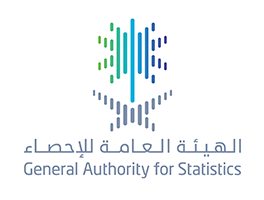
الهيئة العامة للإحصاء تشارك في اجتماع اللجنة الفنية الدائمة للإحصاء
The Permanent Technical Committee for Statistics of the Arab League held its forty-ninth meeting in Cairo on September 26-27 of this year at the headquarters of the General Secretariat of the Arab League. The meeting was attended by delegations representing official Arab statistical agencies, as well as a number of specialized Arab organizations in the field of statistics. The delegation of Saudi Arabia was led by Dr. Fahad bin Abdullah Al-Dossari, President of the General Authority for Statistics.
During the sessions, various technical and administrative topics were discussed, including monitoring the implementation of recommendations from the previous committee meeting, highlighting statistical activities carried out by Arab official statistical agencies in the past period, as well as reports and recommendations from subcommittees.
It is worth mentioning that the Permanent Technical Committee for Statistics aims to enhance Arab statistical capabilities, exchange experiences, information, and technical advice among member countries, and provide the necessary statistical data and indicators to serve the common Arab statistical work.
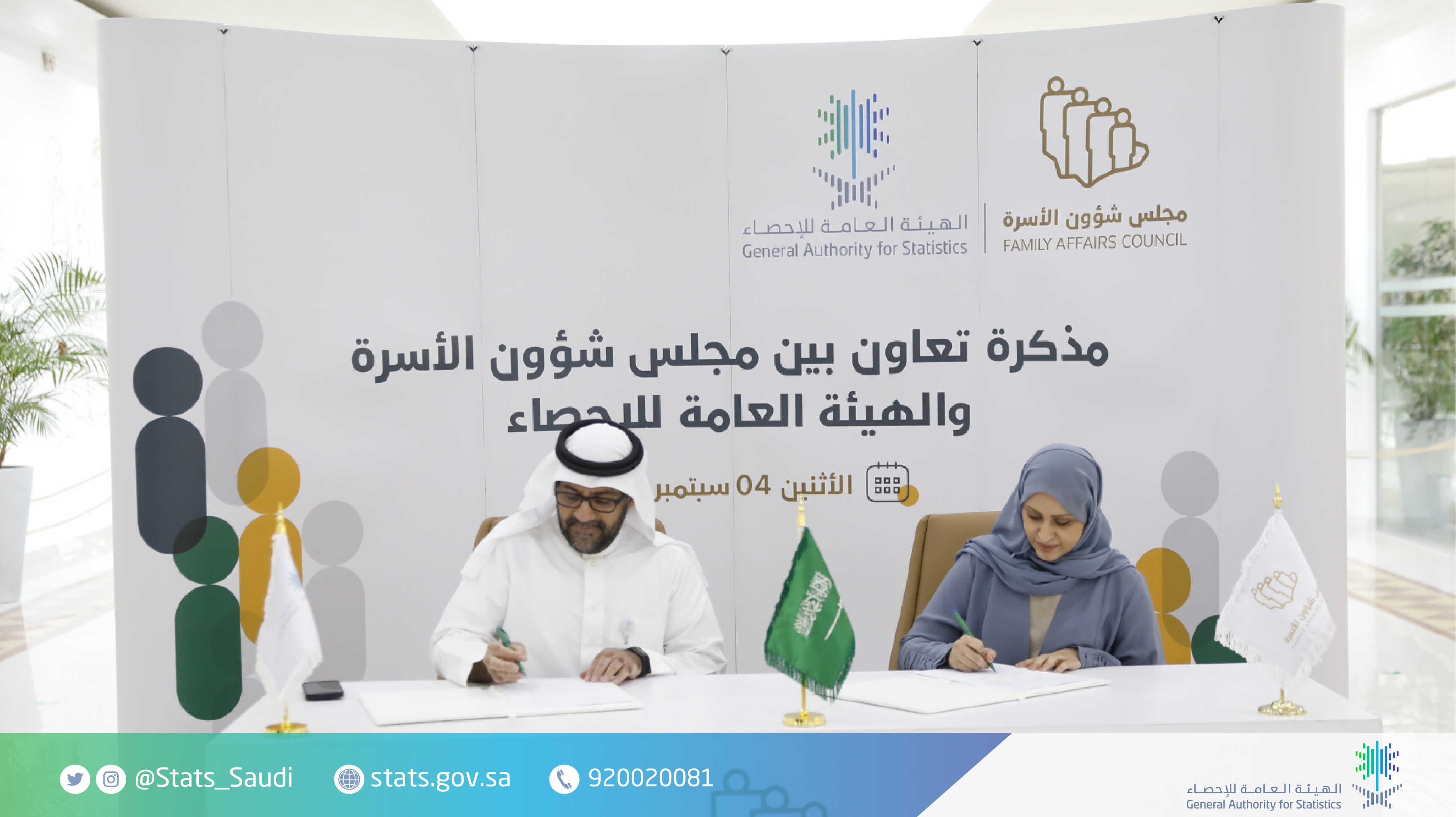
الهيئة العامة للإحصاء ومجلس شؤون الأسرة يوقعان مذكرة تعاون مشترك بينهما
The General Authority for Statistics and the Family Affairs Council signed a memorandum of cooperation yesterday, Monday September 4, 2023. The memorandum aims to enhance integration between the two entities in their respective fields of expertise, establish a general framework for joint activities and tasks, and develop their institutional capacities to serve common interests and goals. The memorandum was signed at the headquarters of the Family Affairs Council in Riyadh. Dr. Fahad Al-Dossari, President of the General Authority for Statistics, signed on behalf of the authority, while Dr. Maimouna bint Khalil Al-Khalil, Secretary-General of the Family Affairs Council, signed on behalf of the council.
The memorandum highlights the exchange of information and data between the two parties - each according to its expertise - in areas of mutual interest, cooperation in issuing statistical publications related to families, exchanging support and technical and knowledge expertise in areas of mutual interest, as well as exchanging advice in the areas of expertise of each party. This includes exchanging research and studies, publications, and making it possible for the staff of both parties to participate in training courses, seminars, scientific conferences, and workshops related to the areas of mutual cooperation agreed upon.
GASTAT completes the project of Transition to Accrual Accounting
The team of the project of transition to accrual accounting was recognized by Dr. Fahad bin Abdullah Al-Dossari, President of the General Authority for Statistics, for meeting the project's requirements and completing its main phases. This helped GASTAT to transit to the accrual accounting principles and be involved in the release of the first national unified financial center.
It is worth mentioning that the transition to accrual accounting and the adoption of international accounting standards in the public sector are initiatives stemming from the National Transformation Program, which is adopted by the Ministry of Finance through its agency for financial and accounting affairs. The project will help provide complete, accurate, and timely information about the financial center, and results of the entities’ activities and cash flows. It will also enhance supervision over revenues, expenses, assets, and liabilities, as well as develop financial departments in government entities and support decision-making processes.
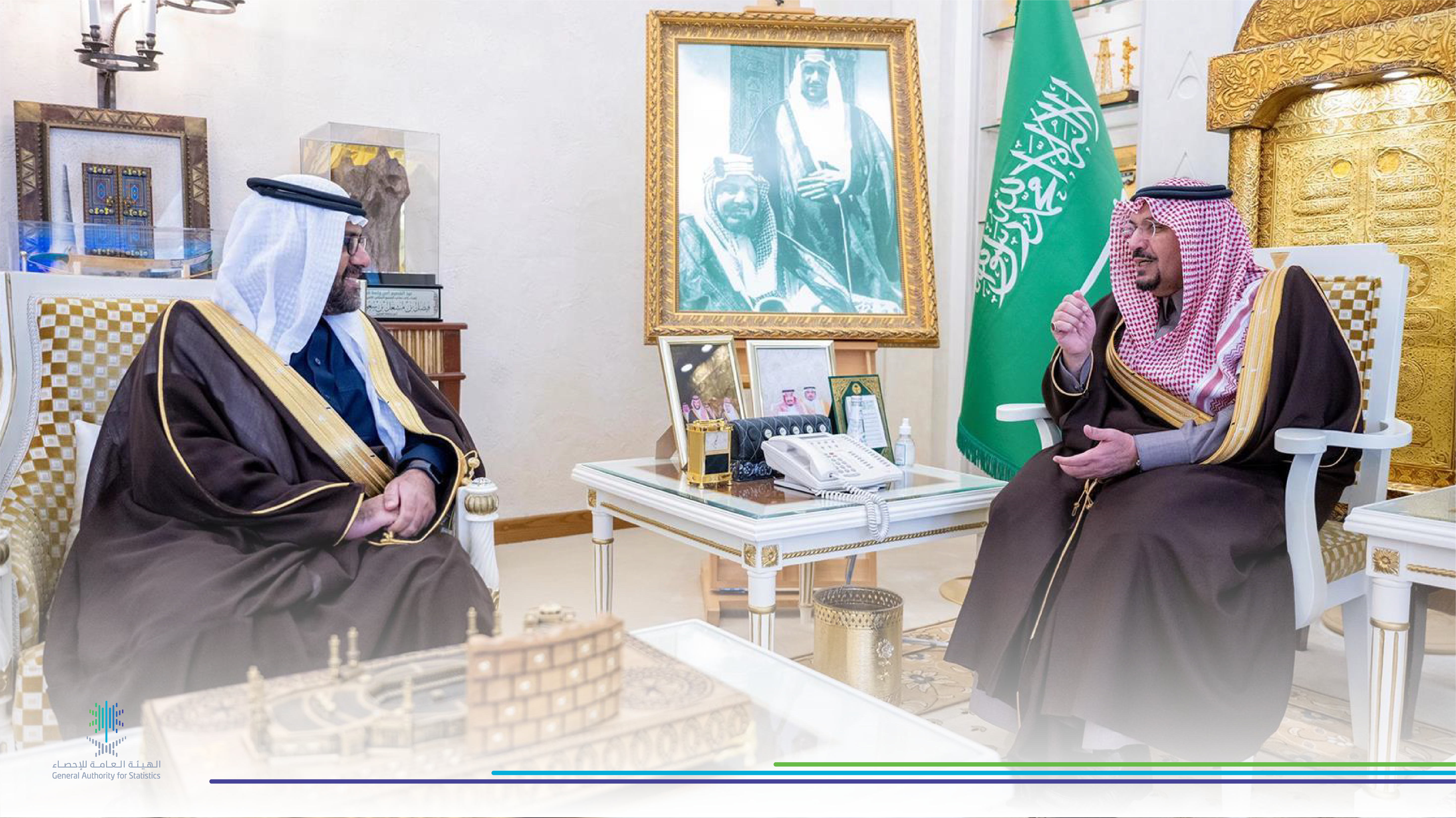
أمير منطقة القصيم يستقبل رئيس الهيئة العامة للإحصاء
Today, His Royal Highness Prince Dr. Faisal bin Mishal bin Saud bin Abdulaziz, Prince of Qassim Region, received in his office Dr. Fahad Al-Dossari, President of the General Authority for Statistics.
His Royal Highness the Governor of Qassim praised the role played by the General Authority for Statistics as the only official statistical reference for implementing, supervising, and regulating the statistical work in the Kingdom of Saudi Arabia, as it provides statistical products in social, economic, and environmental fields to support policymakers and decision-makers in advancing the implementation of development plans.
The meeting included a review of the results of statistics and reports prepared by GASTAT in collaboration with all government entities and stakeholders in the region, providing accurate and comprehensive statistical data that cover all aspects of social, economic, and environmental dimensions in Qassim region.
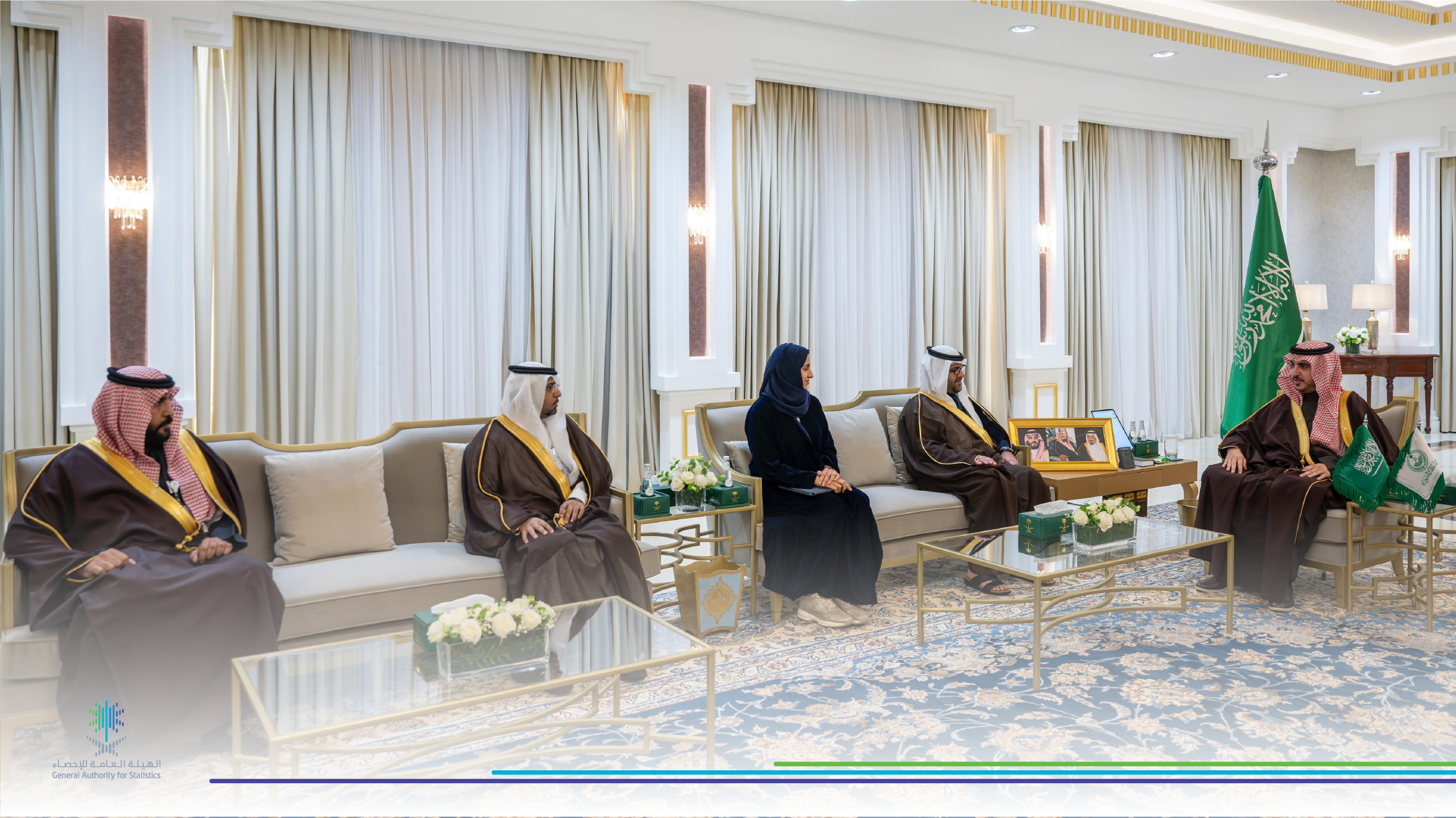
أمير منطقة الجوف يستقبل رئيس الهيئة العامّة للإحصاء
Today, His Royal Highness Prince Faisal bin Nawaf bin Abdulaziz, Prince of Al-Jouf Region, received in his office Dr. Fahad bin Abdullah Al-Dossari, President of the General Authority for Statistics, along with several staff members, and GASTAT’s branch director in the region, Engineer Jarallah Al-Shamrookhi.
During the reception, His Royal Highness was briefed on the works and efforts of GASTAT in providing population and housing statistics at the Kingdom level, specifically concerning Al-Jouf region, its provinces, and affiliated centers.
He also listened to an explanation about the role of GASTAT in providing statistical data to support the development of the region, emphasizing the importance of its role and the information it provides to contribute to the development of all regions.
His Royal Highness, the Prince of Al-Jouf, highlighted the wise leadership's interest in developing and enhancing the regions, praising the role of GASTAT in providing data and indicators that assist in making future decisions and directions for urban, population, and economic development, achieving goodness and prosperity for the country and its citizens.
Dr. Fahad Al-Dossari expressed his gratitude and appreciation to His Royal Highness the Prince of Al-Jouf for his constant attention and continuous follow-up to GASTAT’s work in the region and his support for the branch's activities.
GASTAT Participates in First Conference of Saudi Association for Statistical Sciences
Dr. Fahad bin Abdullah Aldossari, the President of the General Authority for Statistics, participated in the opening of the First Conference of the Saudi Association for Statistical Sciences, which was held in Madinah on Sunday, 11 February 2024, under the theme "Statistics and Health." The conference aimed to discuss the latest developments in the field of statistical data and enhance the desired integration with health authorities in issuing health and social indicators and data that contribute to supporting policymakers and decision-makers.
In his speech at the conference, Dr. Aldossari expressed his sincere thanks and appreciation to the Saudi Association for Statistical Sciences and the Saudi Society for Medical Education for their excellent organization and reception, while also commending the efforts made to ensure the success of the conference.
Dr. Aldossari stated, "For the first time, the General Authority for Statistics (GASTAT) issued six specialized health statistical products at the end of 2023, comprising more than 98 health indicators. GASTAT is keen to adopt a unified working methodology that aligns with the nature of each statistical product, by relying on the Statistical Business Procedures Manual, which is in line with the standards and procedures adopted by international statistical organizations and agencies."
He further explained that the role of GASTAT lies in conducting several specialized health surveys, including the Health Condition Survey, Women's Health and Reproductive Care Survey, Health Determinants Survey, and Health Care Survey. He emphasized that GASTAT collected comprehensive and accurate data from all regions of the Kingdom, following an approved methodology for each survey, and applied best practices, methods, and quality models in data collection and analysis to produce the required health statistical publications and indicators.
GASTAT’s President affirmed that the Authority is committed, within its strategy, to developing its statistical products in general, and health products in particular, in order to provide high-quality health data and indicators that can be relied upon to support all efforts aimed at developing healthcare services. This support aligns with the Sustainable Development Plans in the healthcare sector in the Kingdom and meets international health requirements that contribute to enhancing the Kingdom's international ranking.
It is worth mentioning that the First Conference of the Saudi Association for Statistical Science is sponsored by the Prince Sultan Military Medical City and is held for the first time over a period of 3 days, from 11 February to 13 February 2024. The conference includes several main sessions and workshops on analyzing health insurance data, statistical analysis of medical data using the (R) program, advanced data analysis using the (MS Excel) program, as well as the presentation of scientific medical statistical posters by a group of specialists and speakers, with more than 24 scientific posters and 300 participants.
Appointment of Ms. Sara Alsuhaimi and Renewal of Mr. David Kalisch Membership in GASTAT Board of Directors
The Council of Ministers, in its session held yesterday, Tuesday, 6 February 2024, in Riyadh, issued a resolution appointing Ms. Sara Alsuhaimi as a member, and renewing the membership of Mr. David Kalisch in GASTAT’s board of directors as specialists in the field of GASTAT's work, for a period of three years.
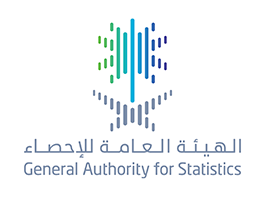
"الإحصاء" تصدر مؤشر الاستثمار الأجنبي المباشر لعام 2022 والربع الثالث 2023 م
The General Authority for Statistics GASTAT has released the annual statistics publication of foreign direct investment FDI for the year 2022 and for Q3 of 2023 in Saudi Arabia. This is the first time GASTAT has announced these indicators after adopting its calculation methodology in October of last year.
According to the publication's results, the total balance of FDI in Saudi Arabia reached 762 billion SAR at the end of 2022. The total inflows of FDI in Saudi Arabia amounted to 123 billion SAR, while the total outflows reached 17 billion SAR. The net inflows of FDI in Saudi Arabia amounted to 105 billion SAR.
In the same context, GASTAT published the statistics of FDI for Q3 of 2023, indicating that the total inflows of FDI in Saudi Arabia amounted to 17 billion SAR. The total outflows of FDI in Saudi Arabia reached 5 billion SAR, while the net inflows of FDI in Saudi Arabia amounted to 11 billion SAR.
On this occasion, Dr. Fahad bin Abdullah Aldossari, the President of the General Authority for Statistics, affirmed that Saudi Arabia's announcement of FDI for the first time adds a new global standard to improve the quality and transparency of the methodology for calculating FDI statistics. This is achieved by providing globally leading levels of transparency and governance.
He also highlighted the joint efforts with the International Monetary Fund in this project and the integration of roles between the Central Bank and the Ministry of Investment to reach the methodology adopted by GASTAT for calculating the index. He explained that it will enable investors to make investment decisions based on reliable results that support decision-makers and policymakers, and to design investment policies that attract more foreign investments and inform investors about the best investment opportunities in Saudi Arabia.
It is worth mentioning that the new methodology was adopted after alignment with the International Monetary Fund in the new methodology and the confirmation of the United Nations Conference on Trade and Development (UNCTAD) to apply the best practices and international standards according to the International Monetary Fund's Balance of Payments Manual. In addition, the World Bank supported the recommendations presented by the International Monetary Fund in its recent report on Saudi Arabia, which form the basis of the new methodology.
The new methodology will contribute to enhancing governance levels and improving the quality of transparency in the statistical data and information for calculating direct foreign investment indicators as an investment destination in Saudi Arabia.
FDI Index includes about 19 new indicators as part of the new methodology approved by the International Monetary Fund, including the balance and inflows of direct foreign investment by economic activity, investing countries, and regions of Saudi Arabia for the period from 2007 to 2022.
KSA ranks 25th globally and first in the Gulf in SPI
The ranking of the Kingdom of Saudi Arabia, represented by the General Authority for Statistics (GASTAT), has jumped 25 places in the Statistical Performance Index (SPI) issued by the World Bank. It ranked first in the Gulf and advanced four places in the same index among the G20 countries, coming in at 15th place after previously being ranked 19th in the 2019 assessment.
The World Bank recently announced the results of the assessment of the maturity and performance of statistical systems (SPI), which included 186 countries. The assessment focuses on five main dimensions distributed over more than 52 indices, covering data sources, statistical products and services, and infrastructure. The Kingdom achieved 100% in the data use dimension and scored 80.8% in the assessment, a significant increase from the previous score of 63.4% in 2019. It was the highest progress among the G20 countries, with a progress rate of 17.4%.
Dr. Fahad bin Abdullah Aldossari, the President of the General Authority for Statistics, explained that the support and empowerment received by GASTAT in the past period contributed to achieving strategic transformations in the statistical production and technical infrastructure fields. This had a great impact on enhancing the statistical role played by GASTAT and achieving progress in comparison to many official statistical agencies around the world. It also contributed to building and calculating high-quality indices and statistical data that lauded by international organizations specialized in the statistical field. Moreover, it supported all sectors of the state with statistical data that assist decision-makers and policymakers. He emphasized the importance of continuous collaboration with partners to further develop statistical production.
It is worth mentioning that this significant progress achieved by the Kingdom in the assessment of the national statistical agencies' performance index (SPI) is a continuation of the efforts of GASTAT in implementing the statistical transformation that aligns with the national transformation in various sectors and fields, in line with Saudi Vision 2030. GASTAT is making relentless efforts to anticipate the future in light of its transformation strategy, which includes developing the technical infrastructure, improving field surveys and statistical products, as well as enhancing partnerships with the government, private, and non-profit sectors. It also works on improving data availability and meeting statistical requirements at the local, regional, and international levels, while focusing on increasing customer satisfaction through continuous development of data presentation and statistical indices interactively and smoothly.
In the same context, this achievement reflects the level of support and empowerment GASTAT receives from the wise leadership and the great confidence in its national role in providing statistical data, building, and measuring national statistical indices that support sustainable development plans and the development of the Saudi economy, and improving the quality of life in the Kingdom.
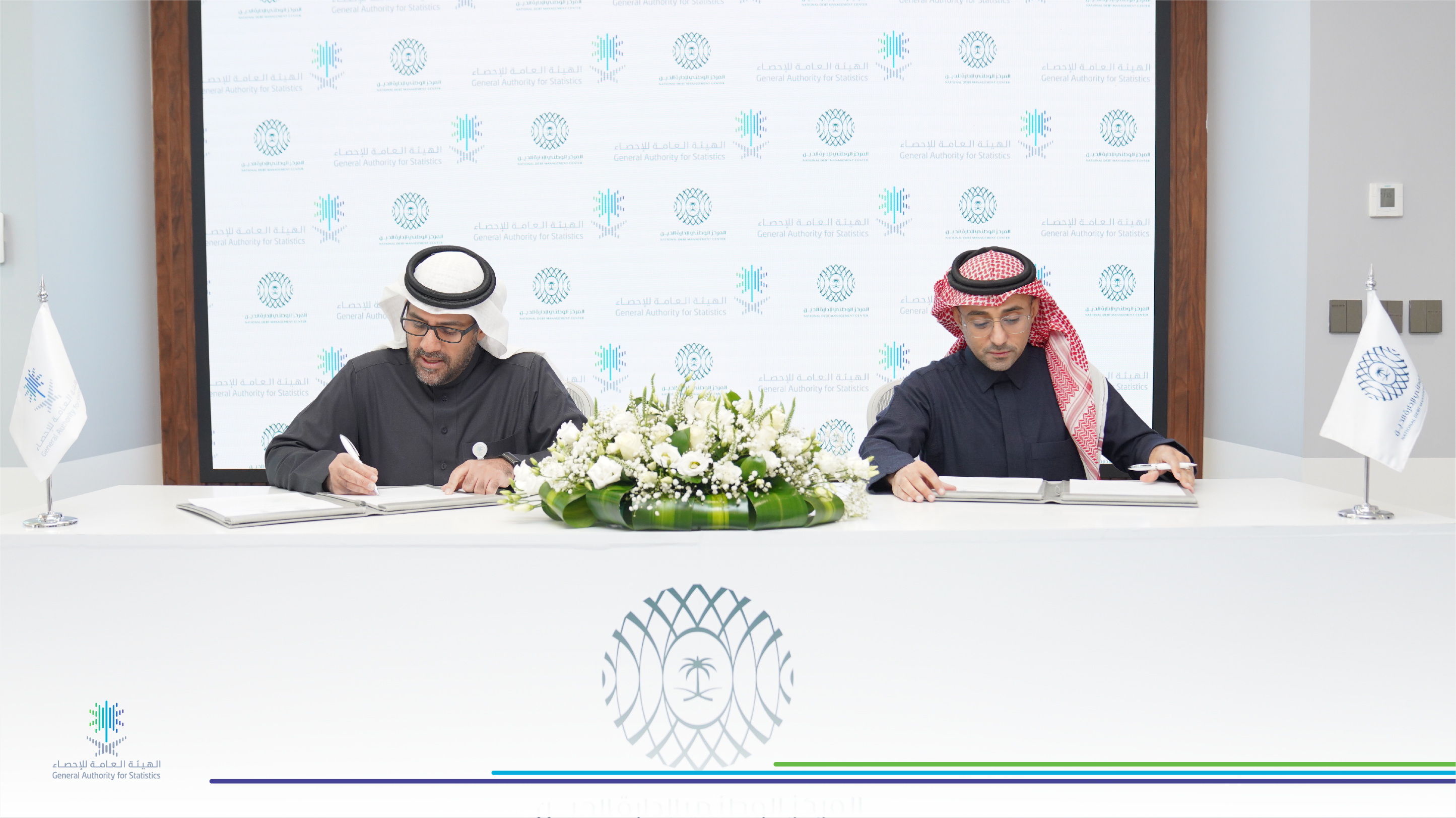
"الهيئة العامة للإحصاء" توقع مذكرة تعاون مع "المركز الوطني لإدارة الدين"
The General Authority for Statistics (GASTAT) has signed a memorandum of cooperation with the National Debt Management Center aimed at enhancing collaboration, strengthening coordination and integration of efforts in their respective fields of expertise, It also aims to establish a general framework for joint activities and tasks. The memorandum was signed by Dr. Fahad bin Abdullah Al-Dossari, President of the General Authority for Statistics, and Mr. Hani bin Madini Al-Madini, CEO of the National Debt Management Center.
The memorandum included several tracks, including the exchange of support, technical and scientific expertise according to each party's specialization, as well as advice in their respective fields of expertise, including research, studies, and publications. In addition, it provides an opportunity for the employees of both parties to participate in developmental courses, seminars, scientific conferences, and workshops.
In this context, Al-Dosssri indicated that the creation and measurement of statistical indicators is a key component of the statistical work that is necessary to achieve the objectives of Saudi Vision 2030. He underlined how crucial it is for GASTAT and the National Debt Management Center to collaborate in order to provide statistical data and indicators, as well as how government entities should integrate with one another. This will positively impact the success of collaborative efforts in line with GASTAT's ongoing development and transformation. In order to improve the economic and social statistical products that support the country's economy and sustainable development, he said that this partnership will help both parties meet their requirements and understand statistical developments and future trends.
On his part, Al-Madani emphasized the significance of this memorandum in the framework of enhancing the knowledge sharing in related fields amongst government sectors. This will improve the ability to analyze data required to demonstrate the Kingdom's strong credit position.
GASTAT Launches the Comprehensive Economic Survey
As part of its efforts to provide statistical data and indicators that contribute to the development of the Saudi economy and support the diversification of its sources, the General Authority for Statistics (GASTAT) launched the Comprehensive Economic Survey, which aims to provide accurate statistical data and indicators to update the base year in the Gross Domestic Product, in addition to updating the statistical business record. Additionally, the survey aims to provide the necessary statistical data that contribute to identifying opportunities and defining challenges in economy development.
GASTAT demonstrated that this survey will help provide statistical data that enables decision-makers, policymakers, and investors to deal with data for the purposes of local, regional, and international comparisons, as well as for conducting studies and analyses.
GASTAT also pointed out that participating in providing data for the Comprehensive Economic Survey will contribute to the development of strategies and development plans, programs, and performance indicators in establishments engaged in various economic activities. It will further assist in building an integrated system of measures for the development and support of economic activities in the Kingdom, in a way that achieves the desired growth and sustainability.
GASTAT has highlighted its ongoing commitment to utilizing all available resources to achieve precise statistical indicators, in line with the latest scientific methodologies and standards. This includes the implementation of the Comprehensive Economic Survey. It detailed that survey procedures would encompass telephone communication, self-completion, and field visits to collect economic data across different sectors. The objective is to offer a distinct overview of the economic indicators essential for understanding growth rates across various and economic establishments and sectors. This initiative is considered a crucial step towards fulfilling the objectives of Saudi Vision 2030.
Moreover, GASTAT indicated that the Comprehensive Economic Survey encompasses all economic activities in the Kingdom, regardless of their size, type, or geographic scope. It noted that this survey is part of a collaborative framework involving all relevant governmental entities associated with economic activities. This collaboration is reflected in the design of the survey questionnaire, which adheres to precise statistical standards to ensure the provision of accurate statistical data and indicators used in measuring various aspects of economic indicators' preparation process, where this would help in understanding the growth rates of these sectors.
GASTAT emphasizes that all data are treated with utmost confidentiality in accordance with the General Statistics Law issued by the Council of Ministers. It is impossible to publish data of establishments collected through electronic questionnaires. GASTAT is committed to protecting the privacy of this data, ensuring that it is only used for statistical purposes. This includes producing aggregate results and general indicators, strictly following the laws and regulations of the Kingdom.
Therefore, GASTAT invites all establishments to participate in this survey and provide accurate statistical data and indicators on the economic establishments of the Kingdom. GASTAT also urges everyone to cooperate with the statistical researcher who will collect the required data, given the importance of establishment data in supporting the decision-making process and shaping economic policies.
Furthermore, GASTAT welcomes all inquiries and requests via the unified statistical phone number (920020081), the customer support email (cs@stats.gov.sa), or GASTAT’s website (www.stats.gov.sa).
Comprehensive Economic Survey : https://www.stats.gov.sa/en/awareness-surveys/CCS
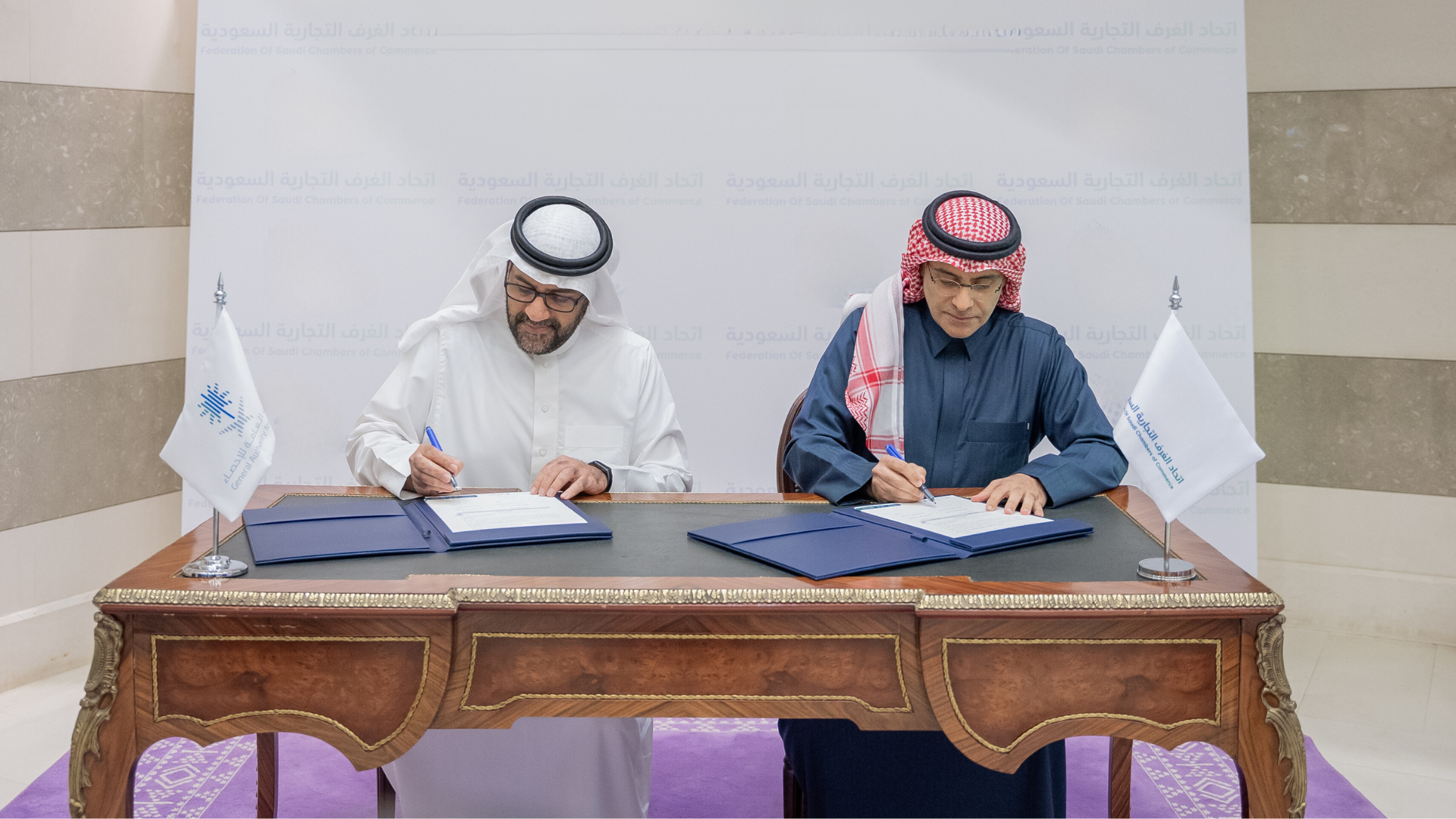
الهيئة العامة للإحصاء توقع مذكرة تفاهم مع اتحاد الغرف السعودية لتطوير المنتجات الإحصائية
Dr. Fahad bin Abdullah Aldossari, the President of the General Authority for Statistics (GASTAT), met with businessmen from the private sector at the headquarters of the Federation of Saudi Chambers (FSC), in the presence of the Acting Secretary General of the Federation of Saudi Chambers, Mr. Waleed H. Alorainan. As part of the meeting, a memorandum of understanding (MoU) was signed to cooperate in the field of statistics and exchange of expertise between (GASTAT) and (FSC). The aim is to contribute to the development and enhancement of economic statistics that support decision-makers and policymakers in both government and private sectors.
During the meeting, the President of (GASTAT) discussed with businessmen and the private sector the pivotal role played by (GASTAT) in providing statistics, economic indicators, and other related information. The steps taken by (GASTAT) within its strategic transformation to develop its statistical products were also reviewed. Additionally, the role of the private sector in enhancing the efforts of (GASTAT) and the integration between them in developing economic indicators and statistical data, including data collection and analysis, was discussed.
The (MoU) emphasizes cooperation in the areas of exchanging expertise and information between the two parties to develop statistical work and programs aimed at raising awareness in private sector establishments about the role and importance of (GASTAT) in performing its national duties. This includes participation in statistical surveys, facilitating access to information, exchanging visits between experts and specialists in relevant statistical fields, and benefiting from databases and information in shared areas. It also includes organizing conferences, seminars, and workshops between the two parties.
The (MoU) was signed by Dr. Fahad Aldossari, the President of (GASTAT), and the Acting Secretary General of the Federation of Saudi Chambers, Mr. Waleed H. Alorainan, in the presence of several staff members from (GASTAT), (FSC), businessmen, and the private sector.
Dr. Fahad Aldossari emphasized that the meeting between (GASTAT) and the private sector comes within the framework of improving performance regarding the development of statistical products and indicators. It aims to identify the needs and opportunities of the private sector in the field of statistical information and data. He also emphasized the importance of integrated work between (GASTAT) and private sector partners, which positively reflects on the success of joint work and enhances cooperation in line with the development and change process that (GASTAT) is undergoing. Additionally, it aims to benefit from advanced statistical programs and products that increase business and investment opportunities in various fields.
From his side, Mr. Waleed H. Alorainan emphasized the importance of cooperation between (GASTAT)and the private sector, given the complementary roles between the two parties. Companies and institutions are the main source of data for GASTAT, while the statistics provided by GASTAT are among the most important sources relied upon by the business sector in studies, analysis, and strategic decision-making. He expressed his hope that this partnership would contribute to meeting the requirements of both parties and understanding the economic statistical developments and future trends for the development of statistical products and private sector opportunities that support the national economy, sustainable development, and the goals of Vision 2030.
It is worth mentioning that (FSC) acts as an umbrella for the business sector and chambers of commerce in the Kingdom. It represents them at the local and international levels and works to develop the role of the private sector in the national economy in coordination with government agencies. It also represents the sector in forums, events, and conferences, and participates in local and international economic decision-making. Additionally, it enhances the Kingdom's trade and investment relations with the world and supports the access of Saudi exports to foreign markets.
GASTAT Obtains the European Institutional Excellence Certificate EFQM
The General Authority for Statistics (GASTAT) obtained the Institutional Excellence Certificate (Qualified by EFQM) from the European Foundation for Quality Management. GASTAT managed to obtain this certificate after achieving compliance with the EFQM model according to the RADAR matrix. This was through the application of institutional excellence standards set by the Foundation, which align with the directions of Saudi Vision 2030.
The certificate was obtained due to commitment to the standards of the European Foundation for Quality Management and the application of its adopted model, which was established in 1989 and is considered the most widely spread around the world. Meeting the model's requirements is one of the directions pursued by several local and international entities in the field of institutional excellence. It enables organizations to achieve high-quality business results within a governance framework that contributes to business sustainability, improves work environments and increases productivity.
This achievement highlights GASTAT's efforts exerted to develop its statistical system by ensuring sustainable quality operations, creating sustainable value for the statistical product, assessing the comprehensive experience, focusing on digital transformation, and utilizing modern technologies and international practices to ensure high efficiency in performance and access to high-quality statistics. The EFQM excellence model, launched by the European Foundation, is a comprehensive framework for corporate management systems, created to assist organizations in their approach towards establishing institutional work, raising the level of performance, meeting the needs of beneficiaries in terms of services, and ensuring sustainability.
In this context, Dr. Fahad bin Abdullah Al-Dossari, President of the General Authority for Statistics, expressed his appreciation for the efforts made to align with the European model of institutional excellence by EFQM. He noted that obtaining this certificate is an important contributor to sustainability and development. It also supports GASTAT and its staff in raising the level of performance and developing their operations, especially since it was achieved through an external evaluation by the European Foundation for Quality Management based on a comprehensive and precise set of practical procedures covering all GASTAT's technical and administrative activities.
He added, "Through continuous institutional planning and development, we have achieved excellence in this critical stage that GASTAT is experiencing, as it is going through a comprehensive transformation at various levels, striving to achieve the highest standards of quality. This comes from the efforts and collaboration of GASTAT staff and the hard work they put in to be part of this success."
It is worth mentioning that the European Foundation for Quality Management is an independent, non-profit organization established in October 1989 when the heads of 67 European companies joined the institution's policy document and declared their commitment to achieving the mission and vision of the European Foundation for Quality Management. The Foundation includes a team of experts and academics to develop the EFQM Excellence Model, a comprehensive framework applicable to any organization, regardless of its size or sector. The Foundation aims to increase the competitiveness and efficiency of all organizations sustainably . It provides its methods and models in more than 30 languages and offers services in over 40 countries worldwide.
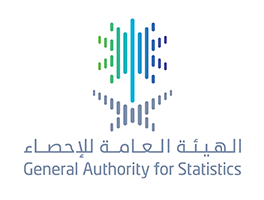
الهيئة العامة للإحصاء: 45.8% من العاملين (18 سنة فأكثر) في المملكة يعملون أكثر من 40 ساعة في الأسبوع
The General Authority for Statistics issued the publication of health and safety at work statistics for the year 2023 in the Kingdom of Saudi Arabia. The publication showed that 45.8% of employees in the Kingdom work for more than 40 hours per week, and 39.6% of employees work for 40 hours per week on average. The actual working hours per day for employees is 8 hours.
The percentage of employees who have been trained on health and safety procedures at work reached 46.6%, while the percentage of employees who have a dedicated health and safety department at their workplace reached 48.7%.
The most common risks faced by employees are standing for long periods of at least four hours daily with a percentage of 28.21%, sitting on a chair for long periods exceeding three continuous hours with a percentage of 28.15%, and moving the upper limbs repeatedly for long periods with a percentage of 17.1%.
7.8% of employees directly or indirectly deal with chemical substances, medical waste, radioactive materials, or toxic gases, while 6.3% of employees face risks such as electrical risks, machinery risks, or drowning.
The percentage of employees who have coverage for basic healthcare reached 89.7%. The most common work-related health issue in the past 12 months is "work-related stress" with a percentage of 3.2%, while 83.5% of employees do not suffer from any work-related health issues.
GASTAT celebrates Gulf Statistics Day with participation of Gulf statistical agencies
The Gulf Cooperation Council (GCC) countries celebrate Gulf Statistics Day under the theme "Statistics for Sustainable Opportunities." This celebration is part of the efforts to enhance statistical work aimed at providing statistical data that supports development plans and achieves the targets of visionary development in the Council's countries.
On this occasion, Dr. Fahad bin Abdullah Aldossari, the President of the General Authority for Statistics, congratulated the employees in the statistical sector. He commended the role of the statistical center of the GCC countries in developing statistical work and coordinating between national statistical centers and planning agencies in the Council's countries. He emphasized that statistics and statistical centers play a prominent role in providing statistical data that contributes to supporting policymakers and decision-makers in the Council's countries.
He added, "The collaborative efforts between statistical centers in the GCC countries have contributed to measuring progress towards achieving the goals of national visions and sustainable development for the Council's countries. This is achieved through joint efforts to enhance performance in terms of exchanging statistical data and implementing the statistical strategic plan. He emphasized the importance of the collaborative relationships among the GCC countries and the extensive cooperation in the field of statistics, providing more opportunities for effective collaboration in the field of information and statistical data."
Statistical work in the Kingdom of Saudi Arabia began early in the year 1349 H (1930) and evolved into an organized effort based on the regulatory, administrative, and technical framework of the General Statistics System issued by Royal Decree No. 23 on 7/12/1379 H (1/6/1960). The General Statistics System regulated the statistical sector by defining the relationship between the General Statistics and Information Department and other entities. This culminated in the issuance of a royal decree in 1436 AH, transforming the General Statistics and Information Department into a public entity named the General Authority for Statistics, endowed with legal personality and financial and administrative independence.
In 1437 H, approval was granted to regulate the General Authority for Statistics. The regulation stipulated that the General Authority for Statistics (GASTAT) is a government entity with an independent legal personality. GASTAT’s board of directors is chaired by His Excellency the Minister of Economy and Planning and consists of the following members: Ministers of Energy, Finance, Human Resources and Social Development, Education, and Industry and Mineral Resources. In addition to the Director of National Information Center, President of the General Authority for Statistics, and two other members specialized in the statistical field.
GASTAT is the only official statistical reference for implementing, supervising, and regulating the statistical work in the Kingdom of Saudi Arabia. It provides statistical products in social, economic, and environmental fields to support policymakers and decision-makers in advancing the implementation of development plans.
It's worth noting that the Ministerial Council of the GCC, convened in Manama, Kingdom of Bahrain, in November 2016 during its 141st session, approved the designation of a Gulf Statistics Day to be observed annually. The significance of this day lies in emphasizing the partnership of the entire society with statisticians and highlighting the vital role statistics play in achieving sustainable development for the Council's countries. It also underscores the strategic role of the Gulf statistical system in decision-making and the development of policies in the region.
GASTAT wins excellence award for website performance and digital content efficiency at the level of government entities 2023
General Authority for Statistics (GASTAT) has been awarded the excellence award for website performance and digital content efficiency, ranking among the top 10 government entities out of a total of 383 government websites for the year 2023. This recognition was received at the Digital Government Forum, held recently under the theme "Our Future is Now" organized by the Digital Government Authority. GASTAT was recognized for its outstanding performance in website efficiency and digital content, and the award was received by Mr. Mohammed Al-Rasheed, Vice President Operations.
In the same context, the General Authority for Statistics is currently implementing an ambitious digital transformation project aimed at achieving a high-quality technological infrastructure that competes regionally and globally. GASTAT also adheres to the highest international standards practiced by specialized institutions in statistical data and information. It seeks to enhance the utilization of its statistical publications and products through the most user-friendly and flexible technological methods. This includes providing users with access to statistical data, the ability to review and download it, as well as presenting the data in ways that contribute to understanding the results and indicators issued by GASTAT.
It is worth mentioning that the Digital Government Forum aims to highlight the achievements of the digital government, showcase its success stories locally and internationally, and enable digital community leaders to meet, communicate, exchange experiences, build partnerships, share successful practices, and discuss challenges. The Forum is also designed to explore modern technological best practices, review future trends of digital governments, and explore investment opportunities in the digital sector in the Kingdom.
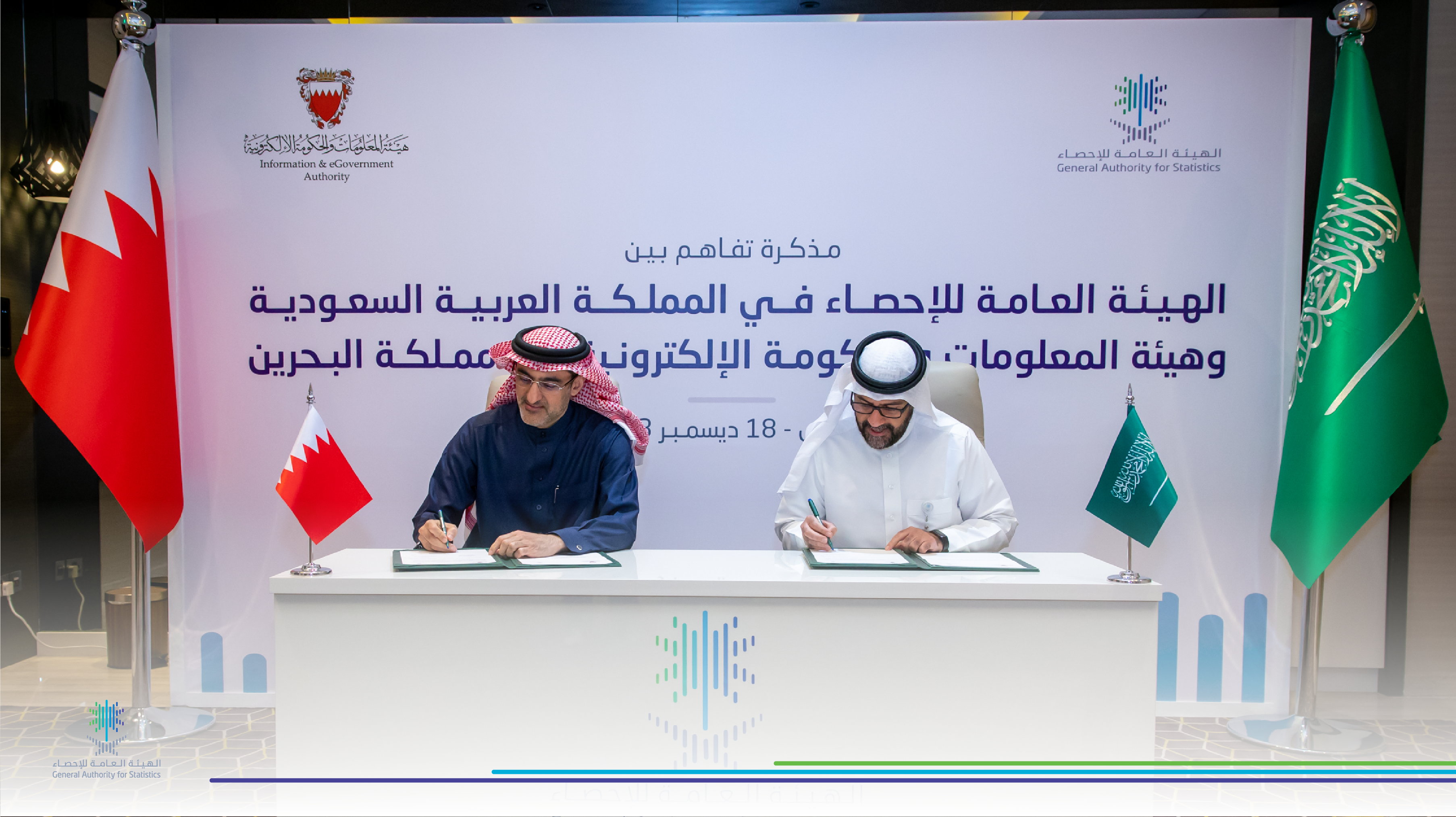
“GASTAT” and Information & eGovernment Authority in the Kingdom of Bahrain sign MoU
The General Authority for Statistics and the Information &eGovernment Authority in the Kingdom of Bahrain have signed a memorandum of understanding( MoU) to cooperate in the field of statistics and exchange of expertise. The aim is also to benefit from the best global practices to develop and enhance statistical work in both countries, in line with international standards, and to support decision-makers and scientific research. The (MoU) was signed by Dr. Fahad bin Abdullah Aldossari, President of the General Authority for Statistics, and Mr. Mohammed Ali Al-Qaed, CEO of the Information &eGovernment Authority in the Kingdom of Bahrain, in the presence of Duaa Sultan Alharban, Deputy Chief Executive, Statistics and Population Registry, and Ms. Lulwa Sami, Director of Communication and Marketing Department at the eGovernment Authority.
The (MoU) includes cooperation in areas such as exchanging expertise and information between the two parties to develop statistical work, including data availability, big data, IT infrastructure, exchange of statistical awareness programs, facilitating access to information, exchanging visits between experts and specialists in relevant statistical fields, and organizing conferences, seminars, and workshops. During the agreed period of the (MoU), which extends for five years, both sides will work on developing joint plans and programs to achieve the desired goals of cooperation between the statistical authorities of Bahrain and Saudi Arabia.
From his side, Dr. Fahad bin Abdullah Aldossari, President of the General Authority for Statistics in the Kingdom of Saudi Arabia, affirmed that the (MoU) aims to enhance the level of mutual cooperation between the two sides and strengthen coordination and integration of efforts in the field of statistics. This includes enhancing quality and efficiency, applying best global practices, and transferring expertise between statistical agencies. It also contributes to supporting the strategic work between the two countries in the statistical sector, aligning with the ongoing development of statistical agencies, and providing new opportunities for effective cooperation with the Kingdom of Bahrain in the field of information and statistical data exchange between the two countries.
He added that the (MoU) contributes to the development of methods and techniques for calculating indicators and providing accurate and up-to-date statistical data to enhance the sustainable development goals, supporting decision-makers and policymakers in both countries. He praised the fruitful cooperation between the General Authority for Statistics and its counterpart, Information &eGovernment Authority in the Kingdom of Bahrain, in addition to the exchange of knowledge and technical expertise between the two countries in the statistical field, leading to further enhancement of mutual cooperation in the future.
On his part, Mr. Mohammed Ali Al-Qaed, CEO of the Information &eGovernment Authority in the Kingdom of Bahrain, praised the signing of the (MoU), affirming that the cooperation between the two countries in the field of statistics is an enduring cooperation, reflecting the strength, durability, and depth of the historical and fraternal relations between the two sides. He also explained that cooperation with the General Authority for Statistics in the Kingdom of Saudi Arabia will contribute to achieving several goals, including enhancing joint work between the two countries, improving the efficiency of statistical systems, and establishing a committee to supervise the plans and programs related to the areas of mutual cooperation included in the (MoU). The committee will oversee the implementation of development areas and overcome any challenges that may arise, in order to make optimal use of advanced statistical experiences, expertise, and programs that enhance the quality of the statistical work system.
Furthermore, the CEO emphasized that the signing of the (MoU) with the General Authority for Statistics stems from the distinguished regional leadership of the Kingdom of Saudi Arabia in the field of statistics. KSA possesses an effective statistical system with innovative practices and a model that regional statistical systems can emulate. He affirmed that leveraging these experiences and rich statistical practices is a real gain for the Bahraini statistical system.
It is worth mentioning that the signing of the (MoU) reflects the belief of the eGovernment Authority and the General Authority for Statistics that enhancing regional and international cooperation contributes to meeting the growing demands for statistical data. This requires a statistical system capable of producing high-quality data in a timely manner, in line with the guidelines, definitions, and classifications adopted by the United Nations and compatible with the best international standards and practices. One of the best ways to keep up with emerging developments in the statistical system is through clear coordination and international cooperation that enables the exchange of best practices and transfer of expertise between statistical systems. Therefore, the signing of the (MoU) between Bahrain and Saudi Arabia is a real gain in facing the challenges and developments in the statistical system.
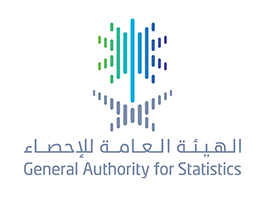
GASTAT: Number of passengers of public transport buses increases in KSA during 2022
The General Authority for Statistics (GASTAT) released the results of the publication of Road Transport Statistics in the Kingdom of Saudi Arabia for the year 2022. It revealed that the number of passengers transported by public buses within and between cities during 2022 reached 43.5 million, an increase of 233.9% compared to 2021. The results of the publication also indicated that the quantity of domestic road freight in 2022 reached 209 million tons, an increase of 6.1% compared to 2021.
According to the results of the publication, the length of paved road network within and between cities during 2022 reached 266,000 kilometers, an increase of 1.6% compared to 2021. Additionally, the number of serious traffic accidents during 2022 amounted to 16,962, a decrease of 6.8% compared to 2021. The number of fatalities due to traffic accidents during 2022 was 4,555, a decrease of 2.1% compared to 2021.
The number of injuries from traffic accidents during 2022 amounted to 24,400, a decrease of 4.2% compared to 2021. On the other hand, the number of vehicles during 2022 reached 14.9 million, an increase of 4.9% compared to 2021. The number of vehicle insurance documents during 2022 was 7.6 million, an increase of 26.9% compared to 2021.
It is worth noting that GASTAT is the only official statistical reference for statistical data and information in Saudi Arabia. It carries out all statistical work, in addition to the technical oversight of the statistical sector. It also designs and implements field surveys, conducts statistical studies and research, analyzes data and information, in addition to the documentation and archiving of all statistical information and data that cover all aspects of life in Saudi Arabia from its multiple sources. Furthermore, GASTAT registers, classifies, and analyzes data. It extracts the data indicators as well.
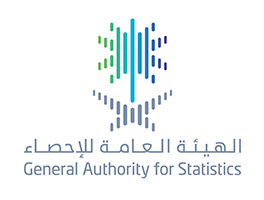
"الإحصاء": ارتفاع الإيرادات التشغيلية للمنشآت الصغيرة والمتوسطة بنسبة 5.8% خلال عام 2022م
The General Authority for Statistics announced an increase in the operating revenues of small and medium establishments (SMEs) by 5.8% during the year 2022, reaching 1.339 billion SAR compared to 1.265 billion SAR in 2021, an increase of 74 billion SAR . These findings are based on the publication of Small and Medium Establishments Statistics for 2022.
The publication also revealed that the value of operating expenses in SMEs reached 687.8 billion SAR in 2022, compared to 659.4 billion SAR in 2021, an increase of 28.3 billion SAR or 4.3% on an annual basis.
Furthermore, the results of the publication indicated an increase in employee compensation during 2022, amounting to 164.2 billion SAR compared to 155.7 billion SAR in 2021, an increase of 8.4 billion SAR or 5.4%.
It is worth noting that the statistics of small and medium establishments are important economic indicators that are regularly implemented and published to enhance the economic database and provide significant statistical indicators to understand the general trends of economic activities in SMEs. This is achieved by providing updated statistics on operating revenues, expenses, and employee compensation in these establishments.
GASTAT issues culture and entertainment statistics from mid-2022 to mid-2023
The General Authority for Statistics has issued a publication on its official website, which includes statistics on culture and entertainment. The results of the publication indicate that 80 % of individuals (aged 15 and above) visited cultural events or activities, while 90% visited entertainment events or activities. Publication also shows that 13% of individuals attended national celebrations, while 11% visited cinemas.
The percentage of Saudi individuals and non- Saudi individuals visiting Saudi entertainment seasons reached 39% and 36%, respectively.
The publication's findings showed that 20% of individuals did not visit cultural events and activities and 40% did not visit them because of lack of time.
According to the publication, 23% of individuals engage in walking, while 19% play football in their free time.
Furthermore, 37% of individuals read at least one book in the past 12 months, while 21% read newspapers and 7% read magazines.
It is worth mentioning that the publication presents data on the visitation and engagement of individuals (aged 15 and above) in cultural and entertainment activities based on the results of the Household Culture and Entertainment Survey conducted by the General Authority for Statistics in 2023. The data was collected using telephone interviews and self-reporting from a selected sample of individuals. For more details, please visit the official website of the General Authority for Statistics (stats.gov.sa).
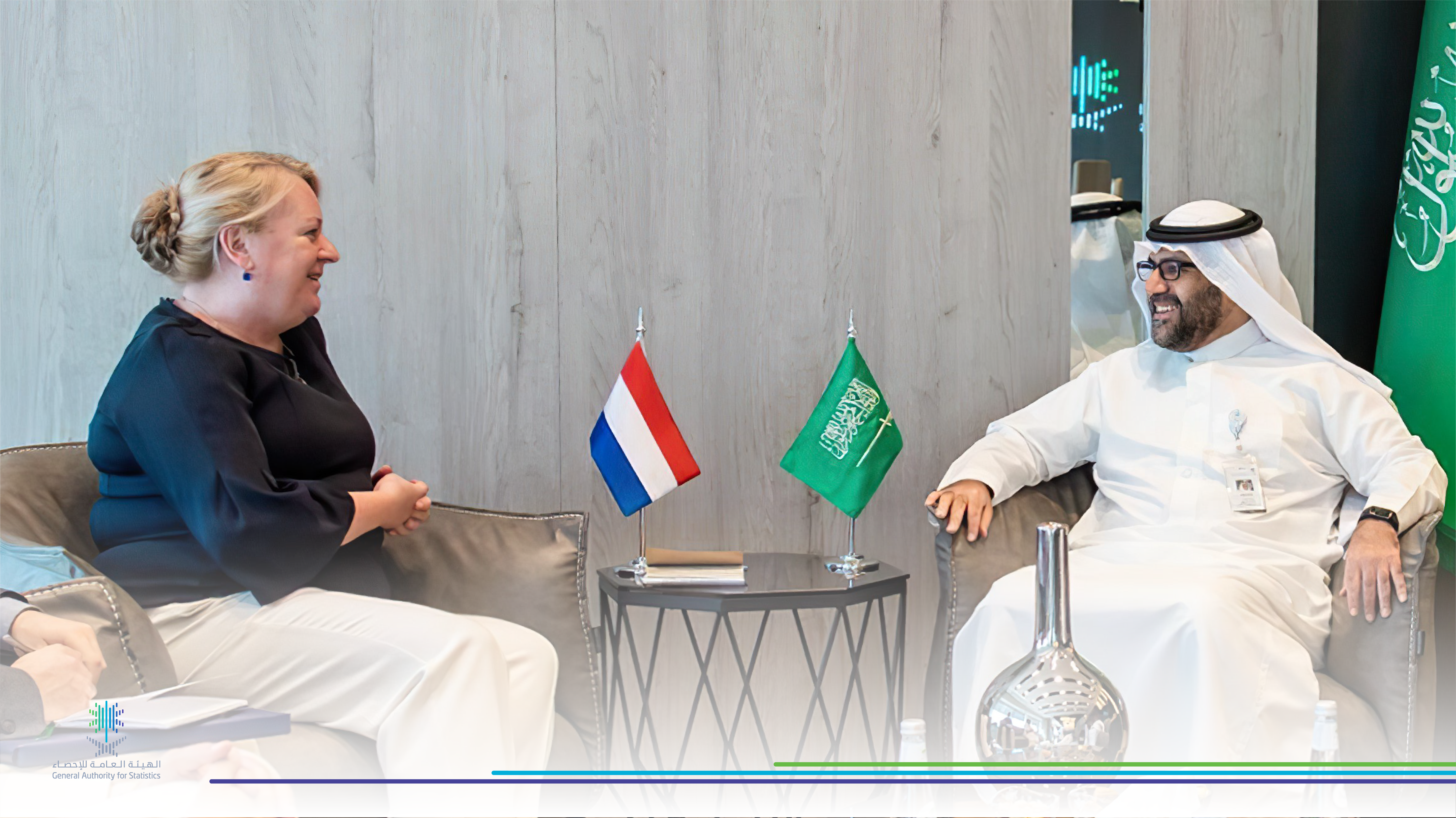
رئيس الهيئة العامة للإحصاء يبحث سبل التعاون المشترك مع الجانب الهولندي
His Excellency Dr. Fahad bin Abdullah Aldossari, President of the General Authority for Statistics, met with Ms. Janet Alberda, Ambassador of the Kingdom of the Netherlands to the Kingdom of Saudi Arabia at GASTAT’s headquarters in Riyadh. During the meeting, several topics were discussed, most notably addressing ways to strengthen joint work in the statistical sector and reviewing a number of topics of mutual interest in statistical work.
It should be noted that the General Authority for Statistics and Statistics Netherlands' office signed a memorandum of understanding earlier aimed at promoting the exchange and development of experience in statistical work between the two countries.
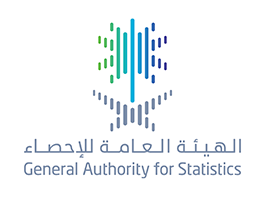
المملكة تعتمد منهجية جديدة لاحتساب بيانات الاستثمار الأجنبي المباشر
In consultation with IMF, Saudi Arabia worked on a new methodology for calculating FDI statistics through cooperation between the Ministry of Investment, the General Authority for Statistics and the Saudi Central Bank.
Saudi Arabia indicated that this methodology aims to improve the quality and transparency of its FDI data according to global best practices, explaining that its final data will be published this year.
UNCTAD, the World Investment Report's issuer, has confirmed that the new methodology follows international standards, according to the IMF Balance of Payments Manual. The World Bank also agreed with and welcomed the recommendations of the International Monetary Fund in its report on the Kingdom, which in turn forms the basis of the new methodology.
In a statement on this occasion, His Excellency the Minister of Investment Engineer Khaled bin Abdulaziz Al Falih, stated that the new methodology is part of a series of ongoing reforms and improvements to improve the quality and transparency of data in the Kingdom, under Vision 2030, and to achieve the objectives and initiatives of the National Investment Strategy, launched by His Royal Highness Prince Mohammed bin Salman bin Abdulaziz Al Saud.
He emphasized that improving the transparency and quality of FDI statistics in the Kingdom would contribute to investors' empowerment and decision makers to make their decisions better, which supports improving the attractiveness of the Kingdom's investment environment and attracting investors from all over the world in line with the Kingdom's objectives by launching the National Investment Strategy, the development of special economic zones, the national initiative of global supply chains and the launch of mega-projects.
He stated that the data confirmed the improved performance of the Kingdom in the formation of fixed capital and foreign direct investment, thereby enhancing the Kingdom's position as a leading investment destination, adding that the Kingdom is keen to keep investors up to date on the most important indicators and data in the Saudi economy, and the availability of many quality investment opportunities, through a platform "Invest in Saudi Arabia", which offers investment opportunities across the Middle East.
President of the General Authority for Statistics Dr. Fahad Aldossari said that the methodology for calculating the FDI index was adopted after technical consultations with the IMF. The methodology is one of the best international practices in calculating FDI statistics, in line with the IMF Balance of Payments manual.
The methodology would contribute to enhancing the accuracy, detail and comprehensiveness of FDI indicators, noting that FDI statistics would serve decision makers in designing policies that would create an attractive investment environment and highlight the Kingdom's investment opportunities.
Through this methodology, GASTAT sought to diversify data sources, increase reliance on register-based sources and provide and disseminate more detailed statistics such as FDI stock and flows by economic activity and the Kingdom's investing States. It also provides FDI indicators more periodically through specialized quadrennial surveys.
The President of the General Authority for Statistics stressed that these efforts are part of GASTAT’s endeavor to provide accurate, comprehensive, high-quality and transparent statistical information and data.
On the other hand, the Deputy Minister at the Ministry of Investment Dr. Saad Al-Shahrani said that access to high-resolution data is crucial not only to measure progress and development, but also to monitor and improve the performance of the domestic economy, and to track investment performance, which accounts for about 25% of the Kingdom's GDP.
Over the past two years, the Ministry of Investment has worked according to the new methodology to analyze more than 70 thousand financial lists of many companies. Covering the past 15 years, indicating that the results of this mega-project will support decision makers, analysts and specialists in the preparation of studies and analyses, and will also form the infrastructure for working to identify investment priorities and follow up on performance for the sectors and countries invested in the Kingdom.
The preparation and development of the new methodology is based on the Kingdom's unprecedented economic transformation under Vision 2030, which represents the road map and the plan for growth and economic diversification and includes: "The Kingdom seeks to adopt global best practices to achieve the highest standards of transparency and governance." Besides improving the quality and transparency of data, Vision 2030 aims to increase the contribution of FDI to GDP, reaching 5.7%, and to increase the private sector's contribution to GDP from 40% to 65% by 2030, becoming one of the world's 15 largest economies.
Saudi Arabia is a leader in updating FDI data through the analysis of financial lists as a source of annual data, with few States following this methodology. This reflects the Kingdom's progress and its reliance on modern methodologies according to global best practices, with the collection and analysis of FDI data and their dissemination in detail expected by the end of this year.
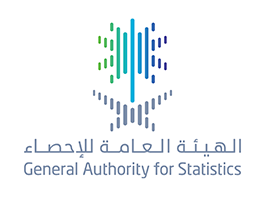
الهيئة العامة للإحصاء تصدر مؤشرات المحددات الصحية و تنمية الطفولة في المملكة لعام 2023م
General Authority for Statistics announced today on its official website (stats.gov.sa) the publication of the health determinants indicators in the Kingdom for the year 2023. The results of the publication indicated that the prevalence of obesity among KSA adult population reached 23.7%, and this percentage is similar between males and females. However, the percentage of individuals with ideal weight was significantly higher among females at 39.6% compared to males at 29.5%. Furthermore, the prevalence of obesity among children under the age of fifteen reached 7.3%, while the percentage of children who are underweight was 41%.
On the other hand, the results of the Early Childhood Development and Child Well-being Statistics publication for the year 2023 revealed that the percentage of children, females and males in the Kingdom who are developmentally on track in health, learning, and psychosocial and social well-being reached 80.1, 83%, and 77.3%, respectively. Tabuk region recorded the highest value for the Early Childhood Development Indicator at a rate of 83.9%, while Jazan region recorded the lowest value at a rate of 75.9%. Furthermore, the percentage of children in the Kingdom under the age of five who have the ability to speak at least one language well made up 78%, with the percentage of males reaching 75.5%, compared to 80.6% of females.
General Authority for Statistics and Saudi Federation for Cybersecurity sign a memorandum of cooperation
Yesterday, Wednesday, November 16, 2023, the General Authority for Statistics signed a memorandum of cooperation with the Saudi Federation for Cybersecurity, Programming, and Drones, on the sidelines of the Black Hat global conference and exhibition held in Riyadh. The agreement aims to enhance integration between the two parties in the field of cybersecurity through the exchange of experiences, knowledge, and relevant information . It also aims to create opportunities for the development and implementation of joint programs and initiatives that contribute to the development of national human resources capabilities in cybersecurity. The memorandum was signed on behalf of the General Authority for Statistics by Mr. Ahmed Al-Ibrahim, Director-General of Cybersecurity and Data Governance, while it was signed on behalf of the Saudi Federation for Cybersecurity, Programming, and Drones by Mr. Khaled Al-Sulaim, Deputy Executive President for Business Sector at the Saudi Federation for Cybersecurity.
The memorandum included the development and exchange of experiences between the two parties, providing opportunities for the employees of both organizations in the field of cybersecurity, exchanging support, technical experiences, and knowledge in areas of mutual interest, as well as providing consultations in each party's areas of expertise.
Saudi Arabia and Estonia discuss ways to enhance cooperation in the statistical field
Dr. Fahad bin Abdullah Al-Dossari, President of the General Authority for Statistics, received Mr. Jan Reinhold, Ambassador of the Republic of Estonia, in a meeting held on Tuesday, November 21, 2023,in Riyadh, to discuss ways to enhance joint work in the statistical sector and opportunities for developing cooperation in the field of statistical data.
During the meeting, the two sides discussed enhancing the level of joint coordination between the their countries in the field of statistical data, working on continuous development of bilateral relations, and using modern technology in disseminating indicators, organizing statistical data and its governance, as well as a number of topics of mutual interest in the statistical field between the two countries.
Dr. Fahad Al-Dossari emphasized the importance of the joint relations between the two countries and the importance of cooperation in the field of statistics. He opened broader and more welcoming prospects for cooperation with European countries, in addition to effective cooperation in the field of statistical information and data between the two countries.
It is worth mentioning that the trade exchange between Saudi Arabia and the Republic of Estonia amounted to 133 million SAR until September 2023, with total exports to Estonia reaching 59 million SAR, while Saudi Arabia’s imports from Estonia amounted to 73 million SAR.
Under the presidency of Kingdom 48th meeting of Board of Trustees of Arab Institute for Training and Statistical Research holds in Jeddah
The 48th meeting of the Board of Trustees of the Arab Institute for Training and Research in Statistics (AITRS) was held in Jeddah. Heads of official Arab statistical centers participated in the meeting. In the opening session, Dr. Fahad Abdullah Aldossari, President of the General Authority for Statistics, delivered an opening speech welcoming the participating delegations and wishing them successful meetings and a pleasant stay in their second home, the Kingdom of Saudi Arabia.
The 48th meeting began with a review of the activities carried out by the Institute during the year 2022, including training courses, studies, and technical consultations provided by the Institute to various Arab statistical agencies in the field of statistical work. The Board of Trustees discussed the Institute's work plan and budget for implementation during the fiscal year 2023/2024.
In addition, discussions were held on statistical activities and initiatives in Arab countries and common statistical issues to contribute to providing accurate data necessary for implementing comprehensive economic and social development plans at the Arab regional level. It also aimed to support official statistical systems in Arab countries in fulfilling their developmental duties at both the national and regional levels by providing accurate data and indicators that contribute to enhancing opportunities for better policymaking.
It is worth mentioning that the Arab Institute for Training and Research in Statistics plays an important role in developing and building the capacities of human resources in Arab statistical agencies. This is achieved by meeting their training and technical consultation needs in the field of methodologies, concepts, and tools for managing official statistical work. The Institute also develops and implements research and statistical studies relevant to the interests of statistical agencies, in line with their needs. Additionally, it contributes to raising awareness of statistical work by participating in various seminars and conferences held at the regional and international levels.
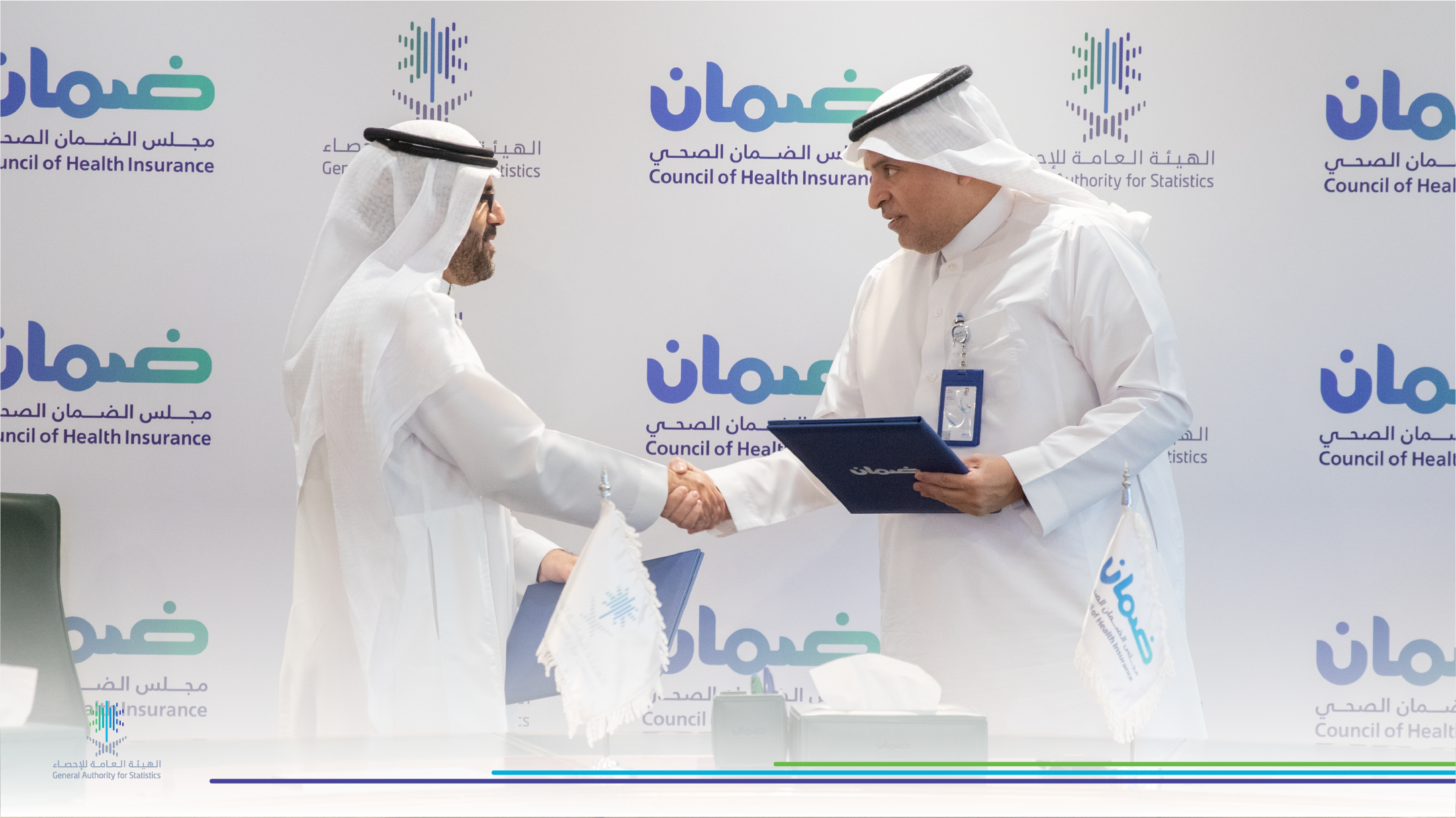
الهيئة العامة للإحصاء توقع اتفاقية تعاون مع مجلس الضمان الصحي
General Authority for Statistics and Health Insurance Council signed a cooperation agreement between the two parties at the headquarters of the Health Insurance Council. The agreement was signed by Dr. Fahad Aldossari, President of the General Authority for Statistics, and Dr. Shabab Al-Ghamdi, Secretary-General of the Health Insurance Council.
The collaboration is a continuation of the significant role that both entities have played in supplying indicators and statistical data. The statistical data and indicators related to the health sector are of high importance to policymakers and decision-makers. Integrating the efforts of both entities enhances the quality and reliability of the data and indicators. Additionally, the agreement includes the exchange of technical and knowledge expertise and working together to improve statistical products and provide technical support in the statistical aspects related to the services of the Health Insurance Council. It also aims to enhance the level of joint coordination in the field of exchanging statistical data, which contributes to providing information and enhancing the services provided to beneficiaries of health insurance.
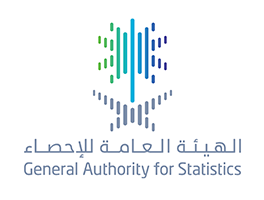
مجلس إدارة الهيئة العامة للإحصاء يعقد اجتماعه الـ (26)
The Board of Directors of the General Authority for Statistics held its 26th meeting, chaired by His Excellency the Minister of Economy and Planning, Chairman of the Board of Directors of the General Authority for Statistics, Mr. Faisal bin Fadel Al-Ibrahim. Several topics were discussed related to the development of statistical work and enhancing the role of the Authority. The Board reviewed the progress made in the projects and strategic initiatives that the Authority is currently working on as part of its strategic transformation. They also discussed the statistical products that will be developed and issued in the coming phase, which will meet the requirements of government and private entities and align with international standards.
It is worth mentioning that the General Authority for Statistics is in charge of designing and implementing field surveys, conducting statistical studies and research, collecting and analyzing data, documenting and tabulating it, and extracting indicators. It is also responsible for all activities related to documenting and preserving statistical information and data, as well as preparing national statistical manuals and classifications according to international standards.
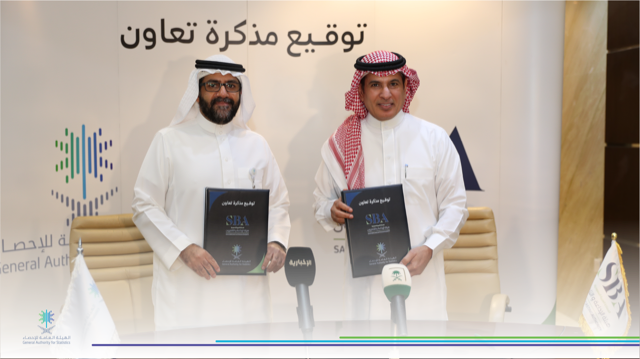
"الهيئة العامة للإحصاء" توقع مذكرة تعاون مع "هيئة الإذاعة والتلفزيون"
General Authority for Statistics has signed a memorandum of cooperation(MoC) with Saudi Broadcasting Authority, aimed at enhancing cooperation between the two entities and promoting coordination and integration of efforts in their respective fields. The (MoC) was signed by Dr. Fahad Aldossari, President of the General Authority for Statistics, and Mr. Mohammed Fahad Al-Harthi, CEO of the Saudi Broadcasting Authority.
It includes several areas of collaboration, including the exchange of support and technical and scientific expertise, cooperation in conducting statistical surveys related to providing statistical data and indicators for the media and advertising market, viewership rates, and viewer satisfaction. It also includes the exchange of advice, including research and studies, and the provision of opportunities for employees of both parties to participate in training courses, seminars, scientific conferences, and workshops organized by each party.
In this context, Dr. Fahad Aldossari, the President of the General Authority for Statistics, emphasized that the statistical work carried out by the Authority is an important component in achieving the goals of Saudi Vision 2030 by building statistical indicators and measuring them. He pointed out that the media sector receives great attention due to its pivotal role and its effective contribution in enhancing knowledge and building awareness among society towards various sectors and their work, including the General Authority for Statistics and its role in providing statistical data and indicators. He added that this (MoC) will support both entities in fulfilling their roles.
Mr. Mohammed bin Fahd Al-Harithi, CEO of the Saudi Broadcasting Authority, affirmed that this (MoC) emphasizes the importance of integration between government entities, which positively reflects on the success of joint work. It also supports the strategy of the Authority in enhancing cooperation with other government entities to keep up with the process of development and change that the Authority is going through.
It is worth mentioning that the General Authority for Statistics is the statistical Authority in the Kingdom, and the only official reference for implementing statistical work, as well as its technical and regulatory supervisor. It has multiple tasks, including collecting statistical data and information from public and private entities and individuals, analyzing and studying this data to calculate various statistical indicators, as well as providing statistical consultations and reports for surveys, research, and other data and statistical services within its scope of work.
The Saudi Broadcasting Authority has recently been working on strengthening cooperation with government entities in various sectors, keeping pace with the development witnessed by the Kingdom in all fields. The Authority is dedicating all its efforts to anything that enhances the Kingdom's position and highlights the continuous work to achieve the ambitious Vision 2030, which is inseparable from the roles of active media entities.
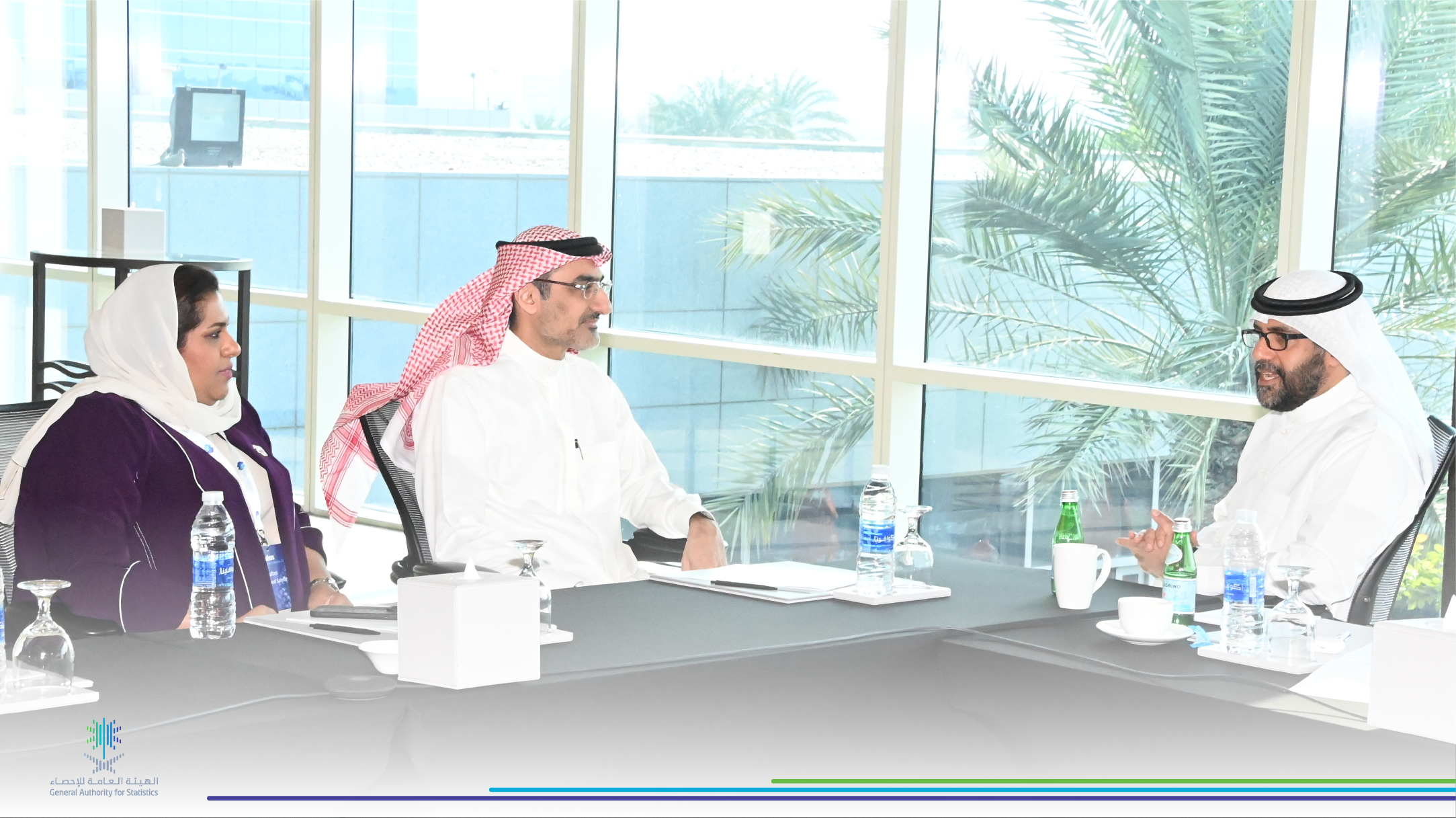
رئيس الهيئة العامة للإحصاء يبحث سبل التعاون المشترك مع الجانب البحريني
His Excellency Dr. Fahad Aldossari, President of the General Authority for Statistics, met with Mr. Mohammed Ali AlQaed CEO of the Information & eGovernment Authority in the Kingdom of Bahrain, on the sidelines of the 9th Global Conference on Statistical Data and Metadata Exchange (SDMX). They discussed ways to enhance cooperation in the statistical sector and reviewed opportunities to develop collaboration in the field of statistical data and various topics of mutual interest in the statistical field between the two countries.
At the beginning of the meeting, Dr. Fahad Aldossari congratulated the Kingdom of Bahrain on the successful hosting of the (SDMX) conference, commending the efforts of the Information & eGovernment Authority, which contributed to the success of the first-ever hosting of the event in the Middle East. He expressed his hopes that the conference would achieve its objectives and contribute to the international efforts aimed at developing the exchange of statistical data and metadata.
During the meeting, both sides discussed enhancing the level of coordination in the field of statistical data and metadata, as well as working on the continuous development of bilateral relations. They also discussed developing methods and techniques for calculating indicators, including household income and expenditure surveys, and providing up-to-date statistical data to enhance joint efforts in sustainable development goals between the two countries. This includes the continuous development of mechanisms for calculating indicators, exchanging statistical data and metadata, and governing them, as well as developing cloud computing techniques and continuously benefiting from modern technologies.
It is worth mentioning that Dr. Fahad Aldossari, the President of the General Authority for Statistics, visited the Kingdom of Bahrain leading a statistical delegation from the Kingdom of Saudi Arabia to participate in the 9th Global Conference on Statistical Data and Metadata Exchange (SDMX), organized by the Information & eGovernment Authority in Bahrain. The conference is a global event held every two years under the Global SDMX Initiative, launched in 2002, and managed by a group of international organizations with the aim of unifying and updating mechanisms and processes for exchanging statistical data and metadata between international organizations and official statistical agencies.
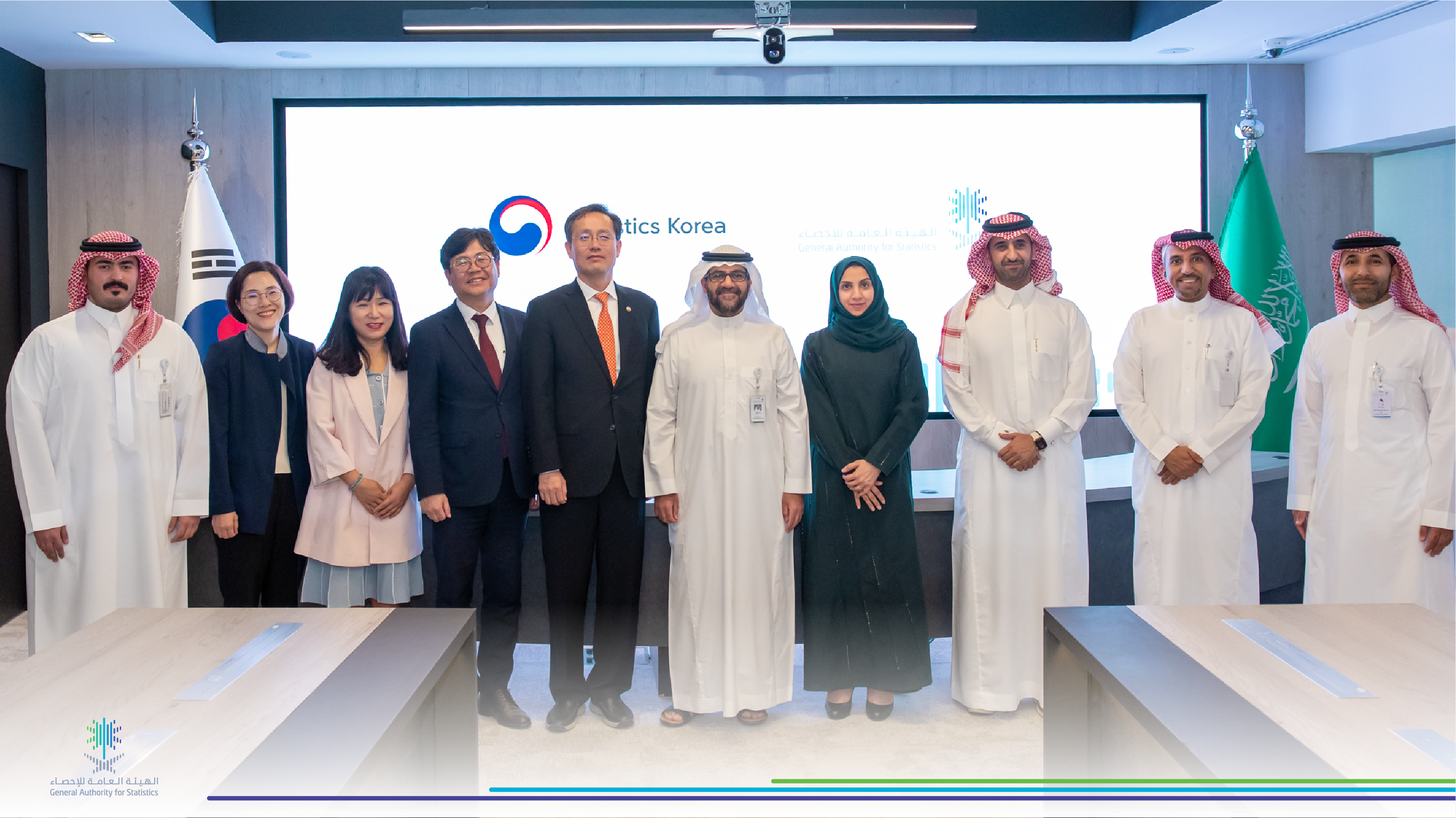
الهيئة العامة للإحصاء تعقد اجتماعاً مع نظيرتها الكورية
The General Authority for Statistics and the Korean Statistical Office held a bilateral meeting with the participation of several statistical officials from both sides, in order to activate the joint cooperation program in the statistical field between the General Authority for Statistics and the Korean Statistical Office, whose signature was witnessed by His Royal Highness the Crown Prince - may God protect him - and the Korean President, and signed by the Kingdom's Minister of Economy and Planning, the Chairman of the Board of Directors of the General Authority for Statistics, Mr. Faisal bin Fadel Al-Ibrahim, and from the Korean side, the Deputy Prime Minister of Economy and Finance of South Korea, Mr. Cho Kyung-Ho.
The meeting discussed the mechanism for activating joint cooperation and implementing the statistical work program between the two countries, in addition to enhancing the level of joint coordination in the field of statistical data and working on the continuous development of bilateral relations. It also discussed the development of methods and techniques for calculating indicators and providing accurate and up-to-date statistical data to enhance the goals of sustainable development in all fields.
The President of the General Authority for Statistics, Dr. Fahad Aldossari, drew attention to the gracious care received by the joint cooperation program in the statistical field from His Royal Highness the Crown Prince - may God protect him - and in the presence of the Korean President. This confirms the care for the statistical sector and its role in providing data and indicators that support decision-makers and policy-makers in both countries. He praised the fruitful cooperation between the Authority and its Korean counterpart, which has lasted for more than six years, during which the two sides exchanged knowledge and technical expertise in the statistical field, leading to the enhancement of joint cooperation in the coming stage.
It should be noted that the joint cooperation program aims to implement evidence-based policies and enhance cooperation in the field of official statistics through the exchange of expertise to produce various indicators and statistics using modern technologies that are in line with global developments in the field of data. It also includes the exchange of statistics that support economic activities and the provision of scientific participation and training opportunities through the organization of joint seminars and workshops between the two countries.

المملكة تشارك في المؤتمر الدولي 21 لخبراء إحصاءات العمل
The Kingdom of Saudi Arabia participated in the 21st International Conference of Labour Statisticians, which was held at the headquarters of the International Labour Organization in Geneva, Switzerland, in October 2023. The delegation of the Kingdom was headed by His Excellency the President of the General Authority for Statistics, Dr. Fahad bin Abdullah Aldossari.
The conference aims to establish new statistical standards for measuring the informal economy and update the previous standards related to the informal sector and employment. It also discussed several topics related to labour market statistics, including standards for voluntary work, child labor, the International Classification of Status in employment, statistics on digital platform work, and more. Experts from government sectors representing the ministries of labour, national statistical offices, employers' organizations, and workers' organizations participated in the conference.
Dr. Fahad Aldossari emphasized the importance of the conference's agenda, which included reviewing the International Classification of Status in Employment (ICSE), updating the implementation of the resolution on labour and employment statistics, statistical standards for measuring labour migration, and youth integration in the labour market. He also highlighted the monitoring of Sustainable Development Goals indicators under the auspices of the International Labour Organization, which measure the level of progress in achieving sustainable development targets. In addition, he mentioned the updating of decisions and guidelines related to measuring income associated with work and the impact of cooperation with the Organization on the statistical indicators issued by the Authority within the framework of international methodologies.
He commended the International Labour Organization's initiatives in supporting the capabilities of statistical agencies and its role in preparing for the International Conference of Labour Statisticians along with its excellent organization, which succeeded in bringing together a large number of experts, specialists, and institutions in the field of labour market statistics.
It is worth mentioning that the International Labour Organization organizes the International Conference of Labour Statisticians once every five years, to set standards in the field of labour statistics at the international level, issue specific recommendations on selected topics in the field of labour statistics, and formulate decisions and guiding principles that are subsequently approved by the Governing Body of the International Labour Organization.
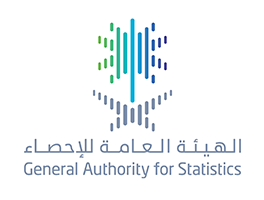
الهيئة العامة للإحصاء تُصدر عددًا من مؤشرات الحالة الصحية في المملكة
General Authority for Statistics announced, on its official website (stats.gov.sa), a number of health status indicators in the Kingdom, as it issued 3 specialized statistical publications that included many indicators related to the general health status, women’s health and reproductive care, in addition to comprehensive health care for the year 2023.
In 2023, the percentage of adults aged (15 years and above) and children aged (under 15 years old) in the Kingdom who have private health insurance to cover basic healthcare expenses recorded 37.5% and 19.5%, respectively. The percentage of adults aged (15 years and above) in the Kingdom who pay healthcare on their own was 21.8%, while the percentage of children whose parents pay their healthcare on their own was 9.7%. The percentage of adults aged (15 years and above) who undergo annual regular check-ups was 47%, according to the publication’s results.
On the other hand, the results of the publication on the health status of the population in the Kingdom in 2023 showed that the percentage of adults aged (15 years and above) who rated their health quality as good or very good was 53%, while the percentage among children and adolescents aged 4 to 14 years was 71%. The percentage of women who had a negative perception of their health status was 30%, compared to 25% among adult men (15 years and above).
Regarding women's health, the results of the publication on women's health and reproductive care in 2023 showed that the percentage of health coverage provided by private health insurance during pregnancy and childbirth for recent births in the Kingdom was 26%, while the percentage of those who pay the costs of providing healthcare during pregnancy and childbirth on their own was 13.5%. The percentage of mothers who had at least four visits to a healthcare provider before childbirth reached 88.8%.
The percentage of births attended by skilled health specialists was 99.8%, out of total births in the Kingdom during 2023, while the percentage of c-section births was 34.5%, out of total births in the Kingdom during 2023. On the other hand, the percentage of married women of reproductive age who have their need for family planning satisfied with modern method was 54%.
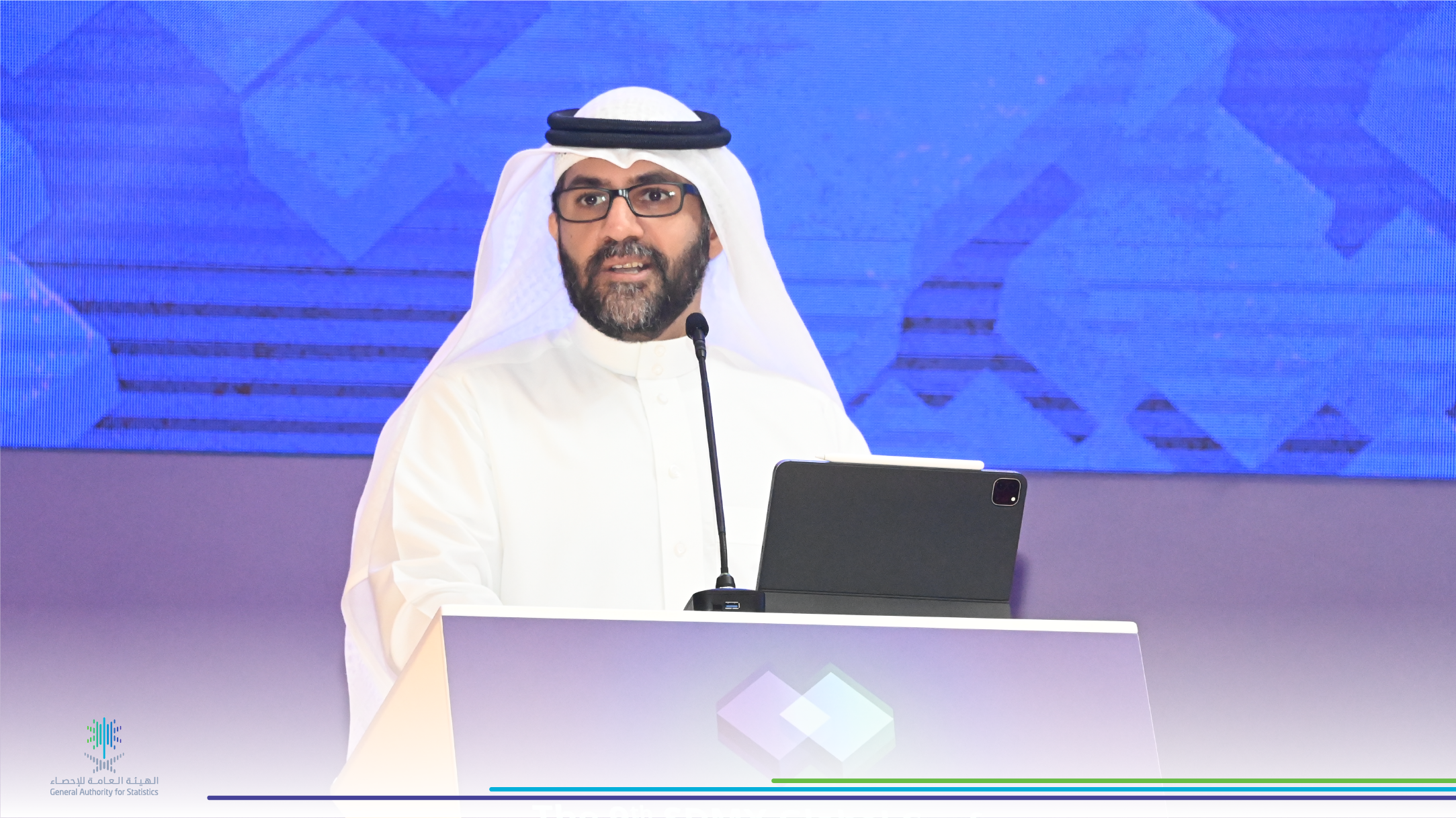
الهيئة العامة للإحصاء تشارك في المؤتمر الدولي التاسع لتبادل البيانات الإحصائية و الوصفية
The General Authority for Statistics participated in the 9th Global Conference on (SDMX), which is being held in the Kingdom of Bahrain under the title of “Empowering Data Communities.” His Excellency Dr. Fahad Aldossari, the President of the General Authority for Statistics, headed the Authority’s delegation participating in the conference with the aim of discussing the latest developments in the field of statistical data and metadata and benefiting from techniques and tools that contribute to enhancing cooperation, knowledge and exchange of metadata through an international initiative to exchange statistical data and metadata between international organizations and a number of statistical offices.
The President of the General Authority for Statistics gave a speech at the conference in which he expressed his sincere thanks and appreciation to the Kingdom of Bahrain for hosting this important conference and for the good organization and hospitality. He also extended his appreciation to the Bahrain Information & eGovernment Authority (IGA), statistical offices, participating international organizations and SDMX sponsors for co-hosting this event with the support of the United Nations Economic and Social Commission for West Asia (ESCWA) and Banca d’Italia.
During his speech, Dr. Fahad Aldossari said that SDMX international initiative was launched in response to the continuing level of rapid developments and the ongoing demand for large and informative data sets to empower the data community and update and unify the mechanisms within this field, whether at a national or international level. He also pointed out that SDMX frameworks and standards are intended to help national statistical offices organize and exchange data and metadata. Additionally, our office uses SDMX to upload KSA’s data on platforms run by the International Monetary Fund and ESCWA. The areas covered include statistics of GDP, labor market, price, export, import, and relevant indicators of sustainable development goals through advancements in the application and use of SDMX rules at the international level, to facilitate the exchange of statistical data with regional and international organizations.
He confirmed that over the recent years the volume of statistical work has expanded, and the Kingdom of Saudi Arabia's statistics sector has seen substantial transformations through statistical initiatives and projects led by the General Authority for Statistics, in order to produce statistical data and indicators and to use the most sophisticated infrastructures for integrating various data sources and best in class infrastructures for data management and governance. In addition to the newly constructed data lake, it makes use of cloud computing techniques, and this technology is continuously being improved as part of the digital transformation initiative that supported development plans, programs, and policies including Vision 2030. In addition to the actively and successfully participates in international workshops and conferences to prepare and enable the national staff to transfer knowledge to the team leading the statistical transformation process in the Kingdom.
On the other hand, the 9th Global Conference on (SDMX) will be held over five days, from 29 October 2023 to 2 November 2023, and includes several key sessions on the importance of using new technologies for the (SDMX ) and utilizing artificial intelligence techniques as an enabling tool to facilitate access to official statistics. A number of workshops are also held with the aim of strengthening international relations and cooperation between major international organizations and benefiting from the technical expertise shared to develop statistical work among statistical offices.
It is noteworthy that the 9th Global Conference on (SDMX) is organized by the Bahrain Information & eGovernment Authority (IGA) and is a major international event in the statistical sector and indicators. It is organized every two years through the international initiative (SDMX), which was launched in 2002 and is managed by a group of international organizations with the aim of unifying and modernizing mechanisms and processes for exchanging statistical data and metadata between international organizations and a number of statistical offices.
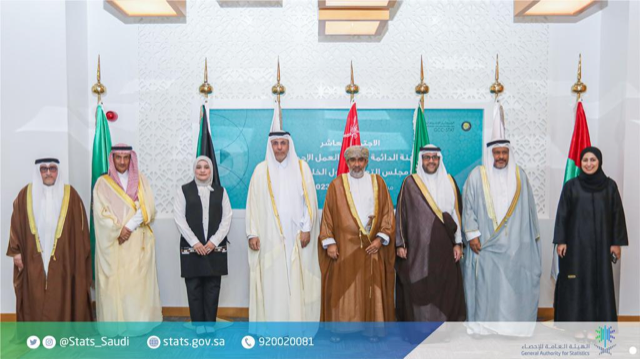
اللجنة الدائمة لشؤون العمل الإحصائي بدول مجلس التعاون لدول الخليج العربية تعقد اجتماعها العاشر في مسقط
The General Authority for Statistics participated in the 10th meeting of the Permanent Committee for Statistical Work, held in Muscat, Sultanate of Oman, with the attendance of heads of statistical centers in the countries of the Gulf Cooperation Council. The committee aims to enhance joint Gulf statistical work, providing statistical data to support development plans and exchanging experiences among member states.
During their meeting, the committee members discussed the continued implementation of the recommendations from the previous meeting held in Jeddah, Saudi Arabia, and reviewed the orientations regarding the Gulf Statistical Work Development Initiative, which aims to enhance cooperation with the Gulf Standardization Organization. They also studied statistical indicators to measure the implementation of decisions by the Supreme Council on the ground. Additionally, they discussed a decision by the Financial and Economic Cooperation Committee to entrust member states with building databases for the common Gulf market. They also discussed global developments and common challenges facing statistical work in the Gulf countries.
Dr. Fahad bin Abdullah Al-Dosari, The President of the General Authority for Statistics and a member of the Permanent Committee for Gulf Statistical Work, presented the experience of Saudi Census 2022 and the phases it went through. He highlighted the integration of administrative data with field data, which contributed to improving the quality of outputs, and the activation of geographic maps. He also mentioned the steps taken by the authority to enhance innovation in statistical work, expand accurate data, and provide open-source data for beneficiaries.
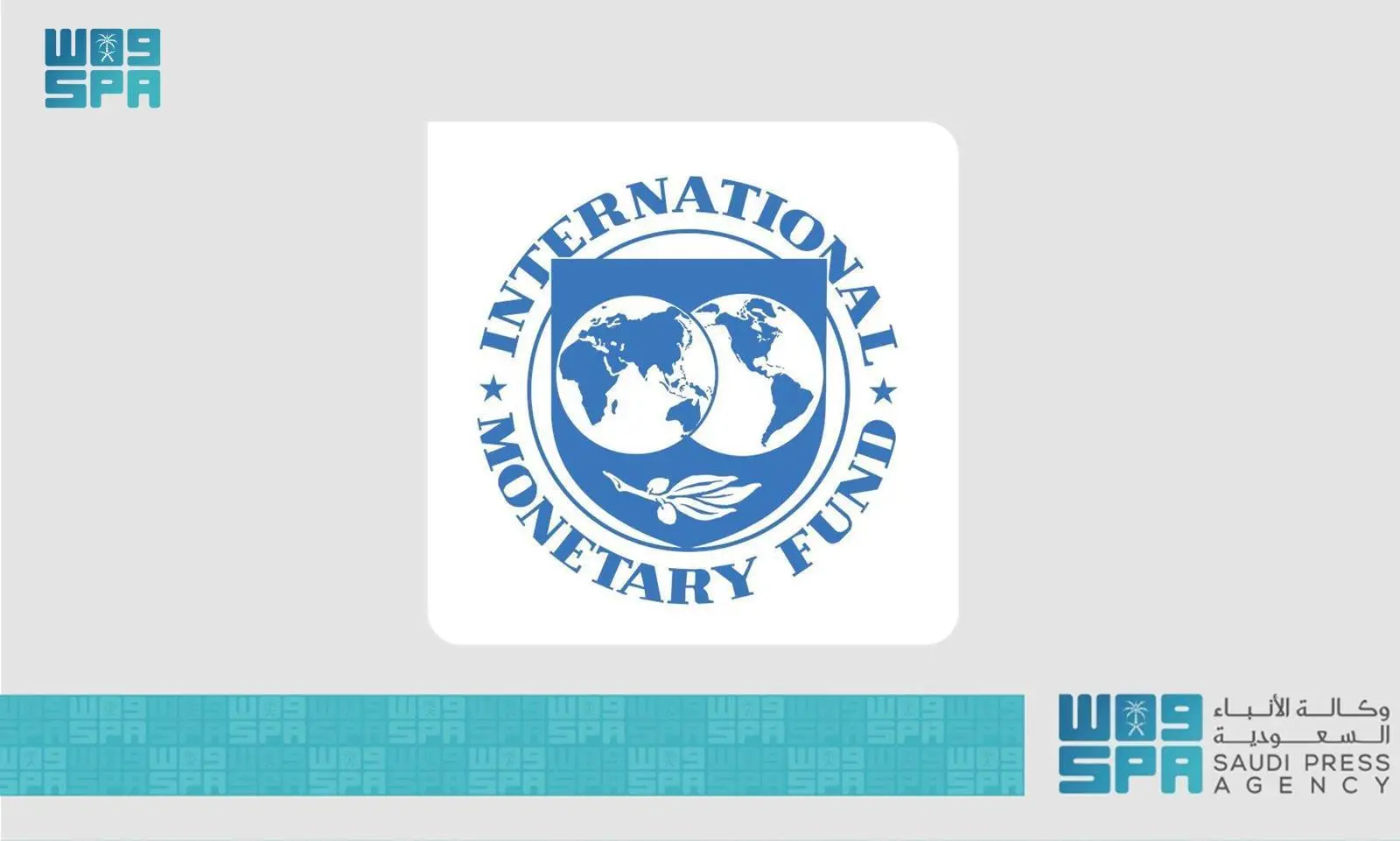
صندوق النقد الدولي: الوضع الاقتصادي والمالي السعودي قوي بسبب الإصلاحات المستمرة في إطار رؤية السعودية ٢٠٣٠
The International Monetary Fund (IMF) issued a positive report on the Kingdom of Saudi Arabia after the conclusion of their 2023 Article 4 Consultation discussions with the Kingdom. The IMF report affirmed that the Saudi economy is in a state of prosperity and growth, and that the Kingdom's fiscal position is strong. The IMF also praised the progress Saudi Arabia has made in implementing its Saudi Vision 2030 reform agenda.
Additionally, the IMF lauded the acceleration of the Kingdom's digital transformation, the increase in female participation in the labor market, reforms in the regulatory and the business environment, ongoing efforts to invest in human capital, and the continuous growth of non-oil GDP.
The report commended the Kingdom's continuing efforts to complete economic and financial reforms and achieve Saudi Vision 2030 targets, noting that the Kingdom was the fastest-growing G20 economies in 2022 with a rate of 8.7%, and with non-oil GDP growing at about 4.8%, while unemployment rates among Saudis declined to their lowest historical level at 8%. The participation of Saudi women in the labor market has reached record levels at about 37% (from 18% in 2017), exceeding the target of 30% envisioned by Saudi Vision 2030. The report also welcomed the ongoing national efforts to enhance women's contribution to supporting the national economy.
In addition, the report praised the Kingdom's efforts to contain inflation that has cast a shadow over the global economy, explaining that it was contained through domestic subsidies/price cap on certain products, as well as the strength of the U.S dollar, which led to the consumer price index (CPI) reaching just 2.5% in 2022. The report noted that although the average index increased in early 2023 to 3.4%, it decreased again to 2.8% by May 2023.
The IMF report emphasized that the continuation of Saudi Vision 2030 reforms represents progress in advancing the country's economic diversification programs to reduce its dependence on oil. It projected a continuation of the strong momentum of non-oil GDP growth, and that average growth will reach 4.9% in 2023, driven by strong consumption spending, increase private investment through projects and programs that enhance the growth of the private sector in addition to the accelerated projects implementation, which will reflect positively on the growth of non-oil GDP, the IMF said.
The report also welcomed the ongoing reform efforts within the framework of the Fiscal Sustainability Program, including improving non-oil revenues, rationalizing spending, and strengthening the public finance framework. It also noted the low and sustainable debt levels and the availability of a strong fiscal space, while praising the remarkable progress in public finance transparency through the expanded budget statement and other detailed reports.
The IMF stressed that the Kingdom's monetary policy (fixed exchange rate) is appropriate and serves the Kingdom's economy, and that the performance of the banking sector remains strong during the current year, thanks to the continuous efforts of the Saudi Central Bank (SAMA) to modernize the regulatory and supervisory frameworks. This contributed to the achievement of high profitability rates (higher than pre-pandemic levels), in addition to high capital adequacy ratios and low non-performing (NPL) loan ratios. The report also welcomed the efforts of the Saudi Central Bank to promote the Kingdom as a fintech hub.
The report praised the continuing efforts by the Kingdom's government to enhance governance, fight corruption, and confront the challenges of climate change. It also praised the plans being implemented to increase renewable energy, the Kingdom's goal to become the largest producer of clean hydrogen in the world, and the tangible role of the Saudi Green Initiative (SGI) in reducing carbon emissions, expecting that these efforts will contribute to reducing emissions to the target level for the year 2030, and indicating that the Kingdom recorded the second-lowest emissions globally per unit produced.
The report noted the positive transformation in the Saudi housing sector through a number of programs that contributed to an increase in the percentage of home ownership to 60.6% in 2022, in pursuit of the Vision 2030 goal of 70% by 2030. It also noted the importance of industrial policies in the success of the Kingdom's efforts toward structural transformation and diversification under Saudi Vision 2030.
With regard to the Kingdom's digital transformation, the report indicated that the Kingdom ranks high in a number of global digitization rankings for example digital infrastructure and the maturity of digital government transformation. Also, the strong digital development in Saudi Arabia has improved financial inclusion, the resilience of the financial sector, and enhanced government effectiveness, pointing out that Saudi Vision 2030 played a pivotal role in accelerating the pace of digital transformation.
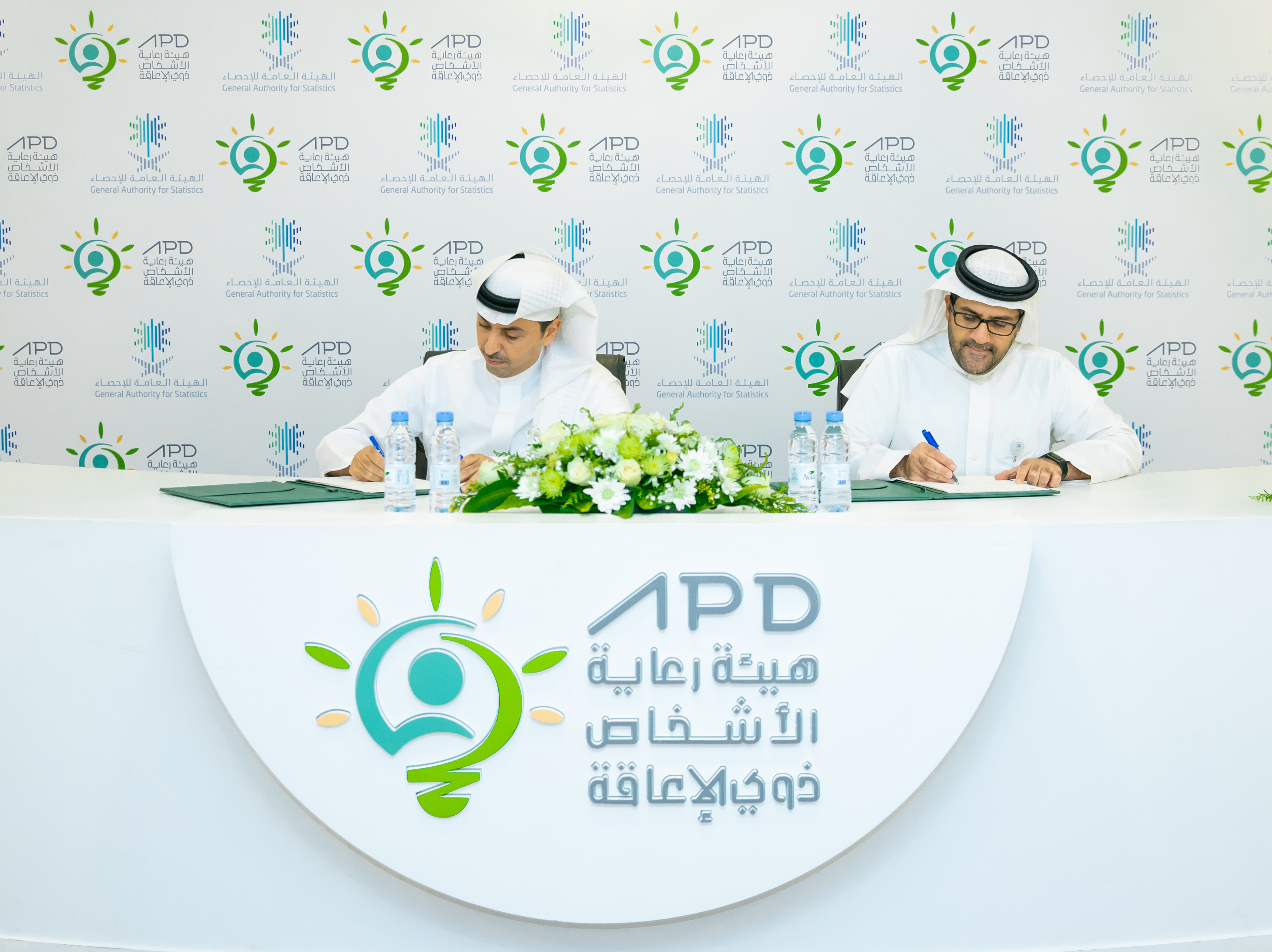
بهدف تبادل الدعم والخبرات الفنية والمعرفية "هيئة رعاية الأشخاص ذوي الإعاقة " توقع مذكرة تعاون مع " الهيئة العامة للإحصاء "
The General Authority for the Care of Persons with Disabilities and the General Authority for Statistics signed a memorandum of cooperation on Monday, 20 Muharram 1445 AH, corresponding to August 7, 2023, in Riyadh. The memorandum aims to enhance the level of joint coordination in the field of statistical data, which contributes to providing data and information and improving the quality of services provided to persons with disabilities, as well as ensuring their necessary care and rehabilitation. The memorandum was signed by Dr. Hisham bin Mohammed Al-Haidari, the CEO of the General Authority for the Care of Persons with Disabilities, and Dr. Fahad bin Abdullah Al-Dosari, the President of the General Authority for Statistics.
The agreement aims to enhance integration between the two entities in achieving the goals of Saudi Vision 2030, through the exchange of relevant official statistics for persons with disabilities. The General Authority for the Care of Persons with Disabilities is responsible for serving them and working towards integrating efforts to improve statistical products for this category. Additionally, the agreement includes providing technical support to the General Authority for the Care of Persons with Disabilities in statistical aspects related to handling and exchanging data and information, issuing reports and publications, and monitoring social variables for persons with disabilities.
It is worth mentioning that the General Authority for the Care of Persons with Disabilities aims to be the comprehensive umbrella for all matters related to persons with disabilities, granting them their full rights and empowering them in collaboration with relevant entities. It seeks to ensure their rights related to disabilities and contribute to enhancing their independence and empowerment through their participation in various activities and full inclusion in all aspects of life, to achieve an inclusive and harmonious society.
